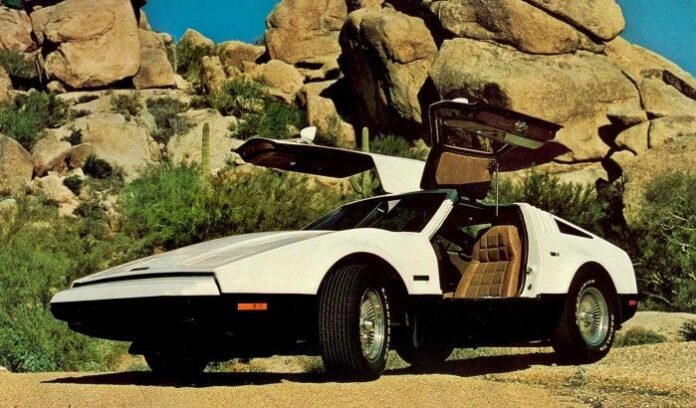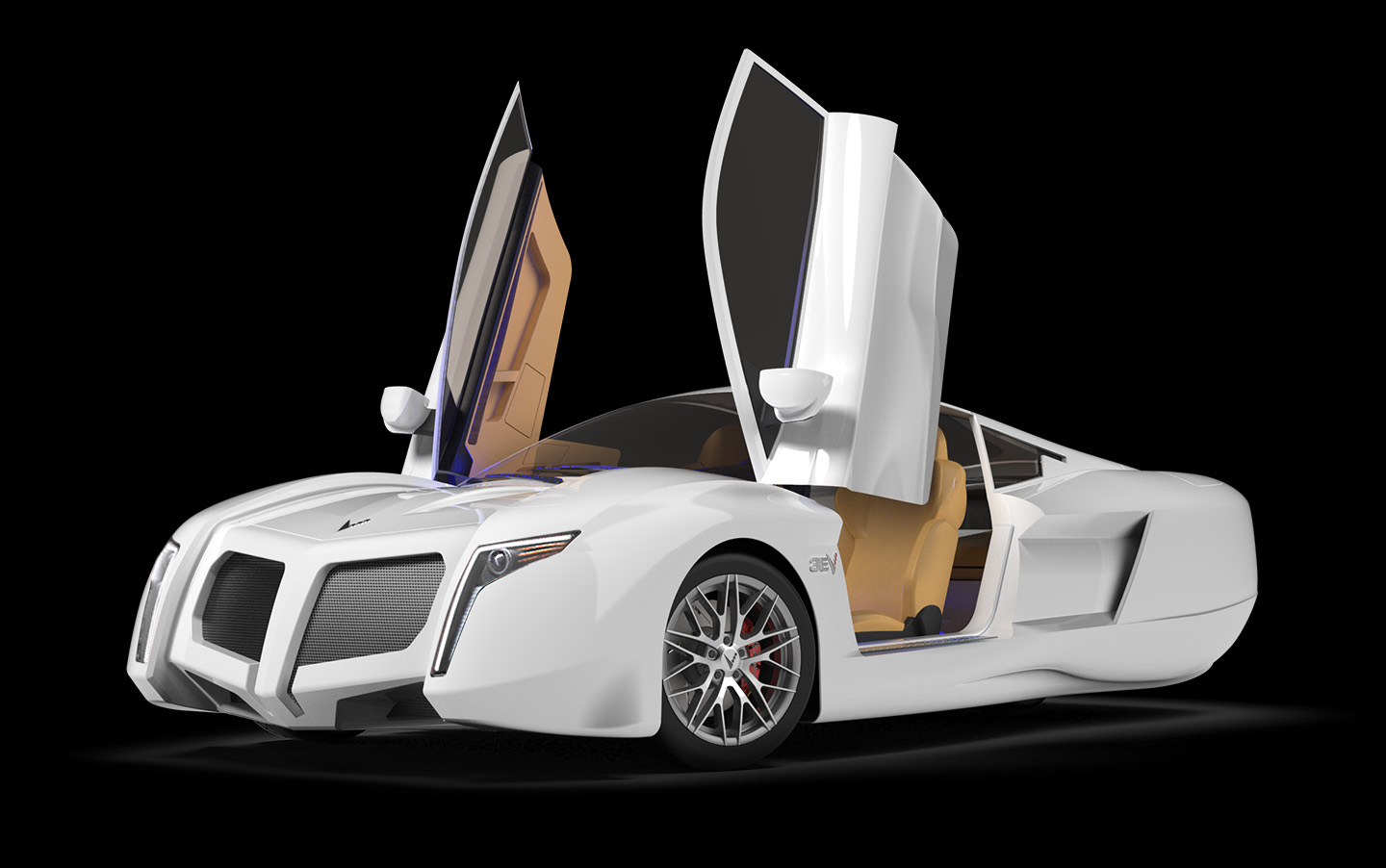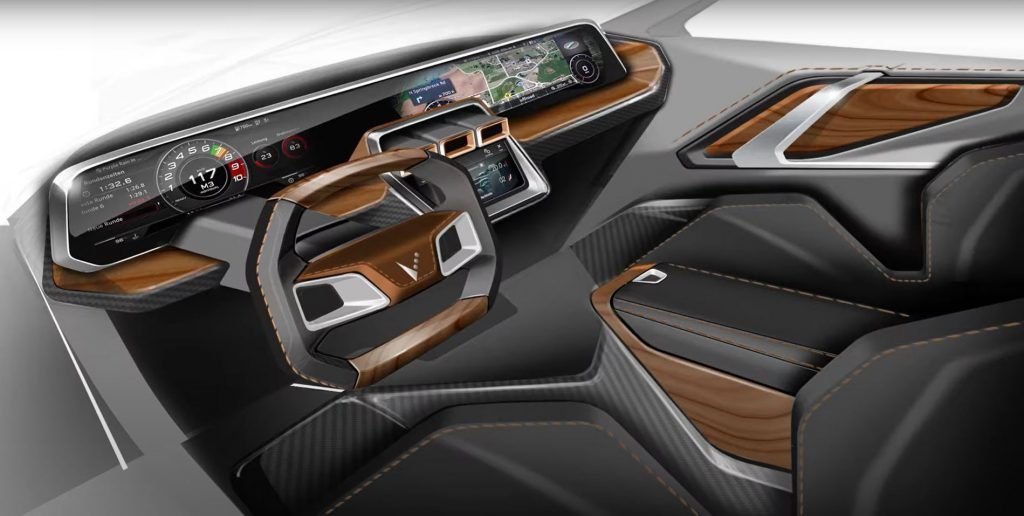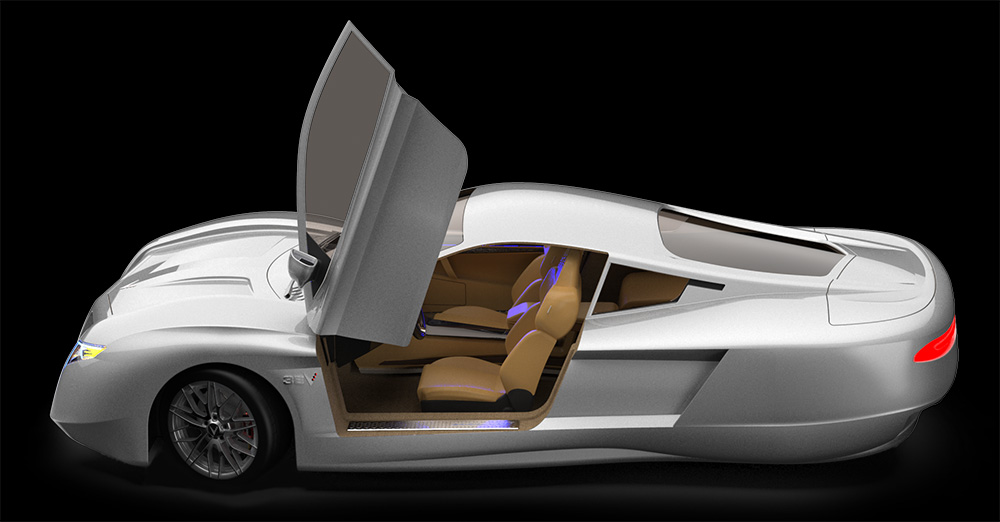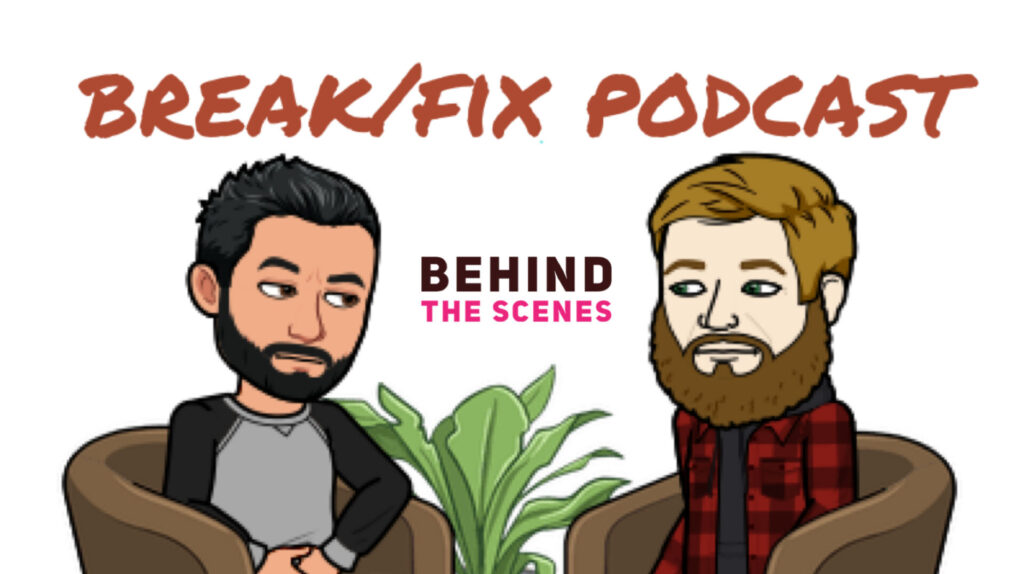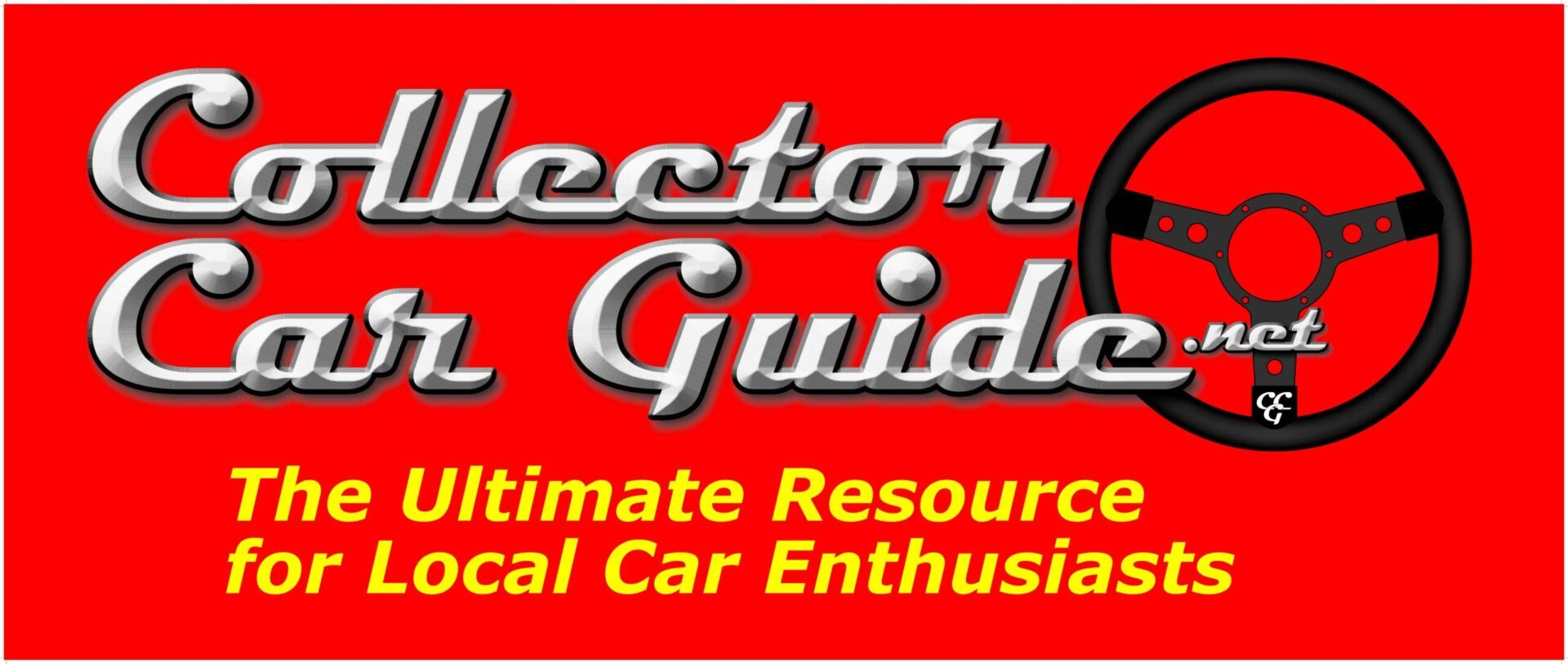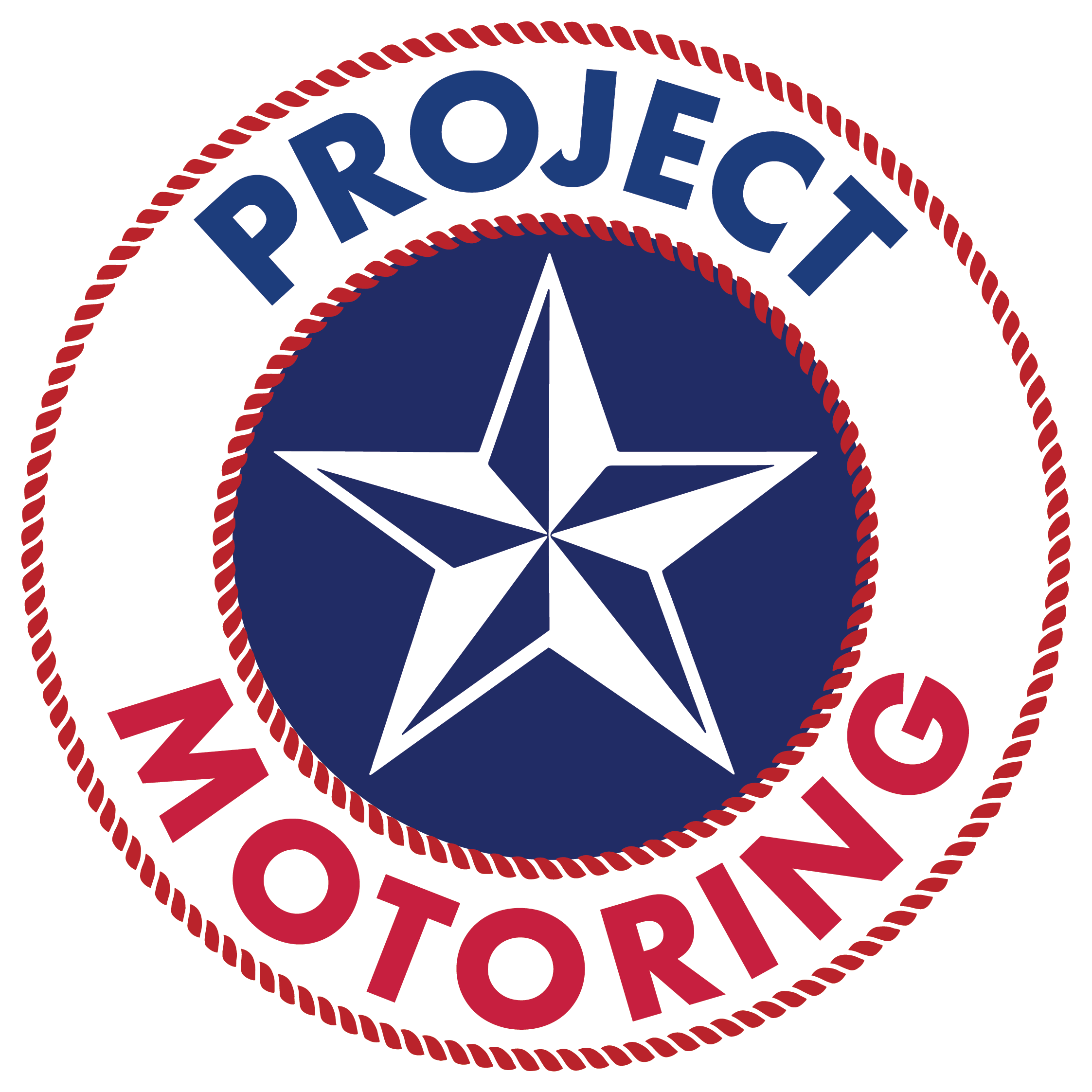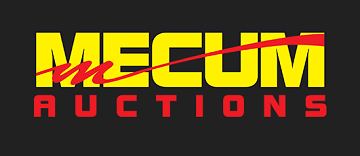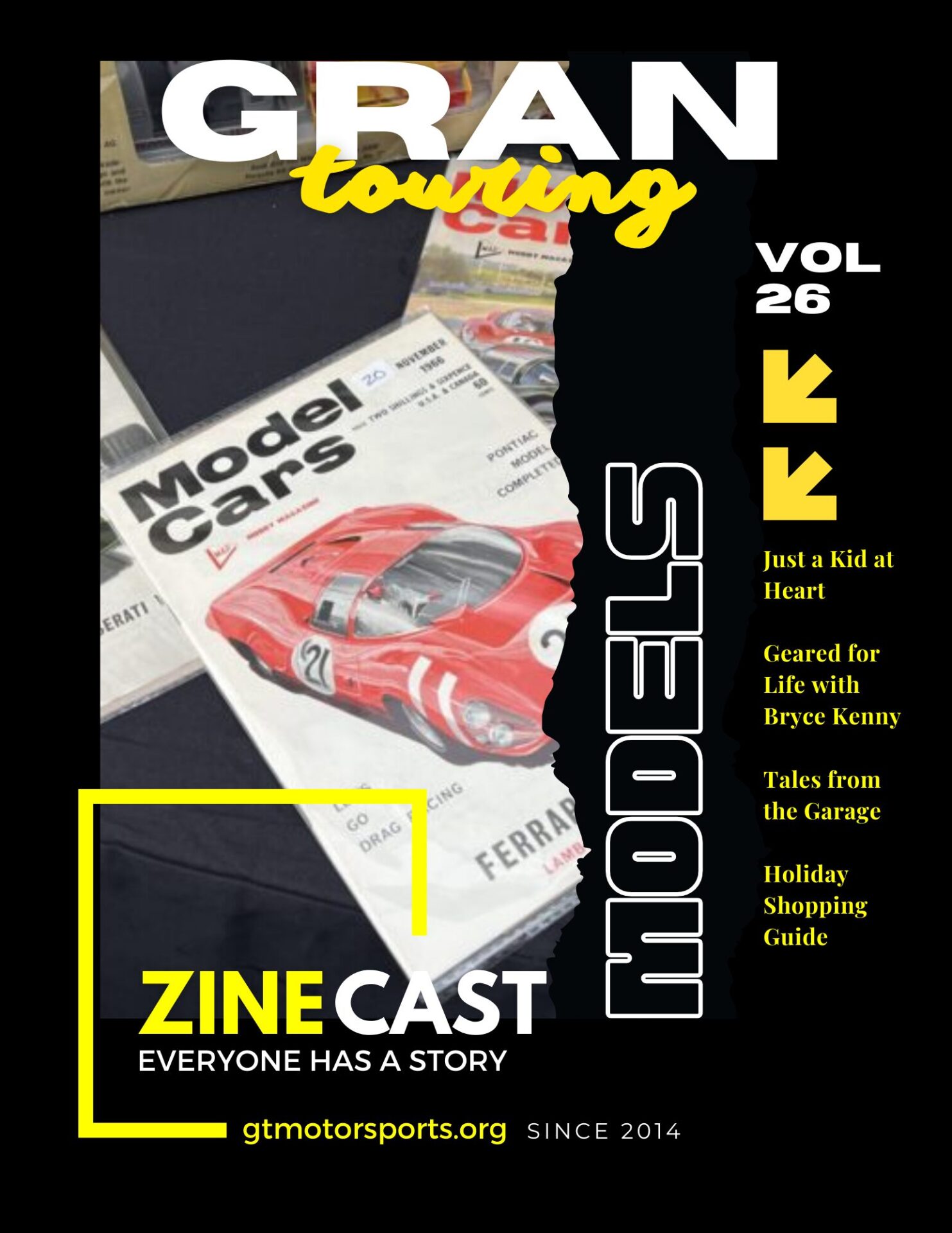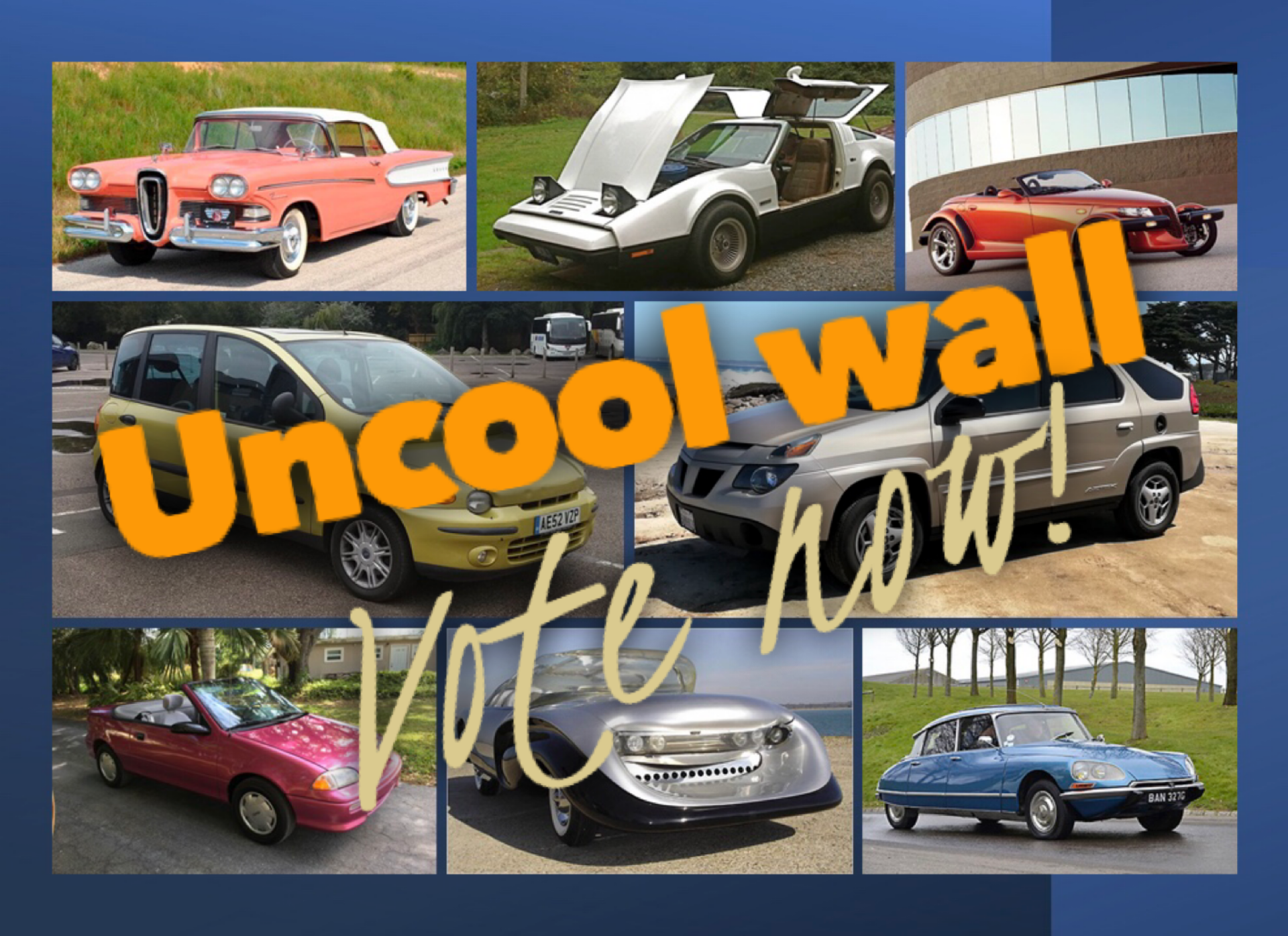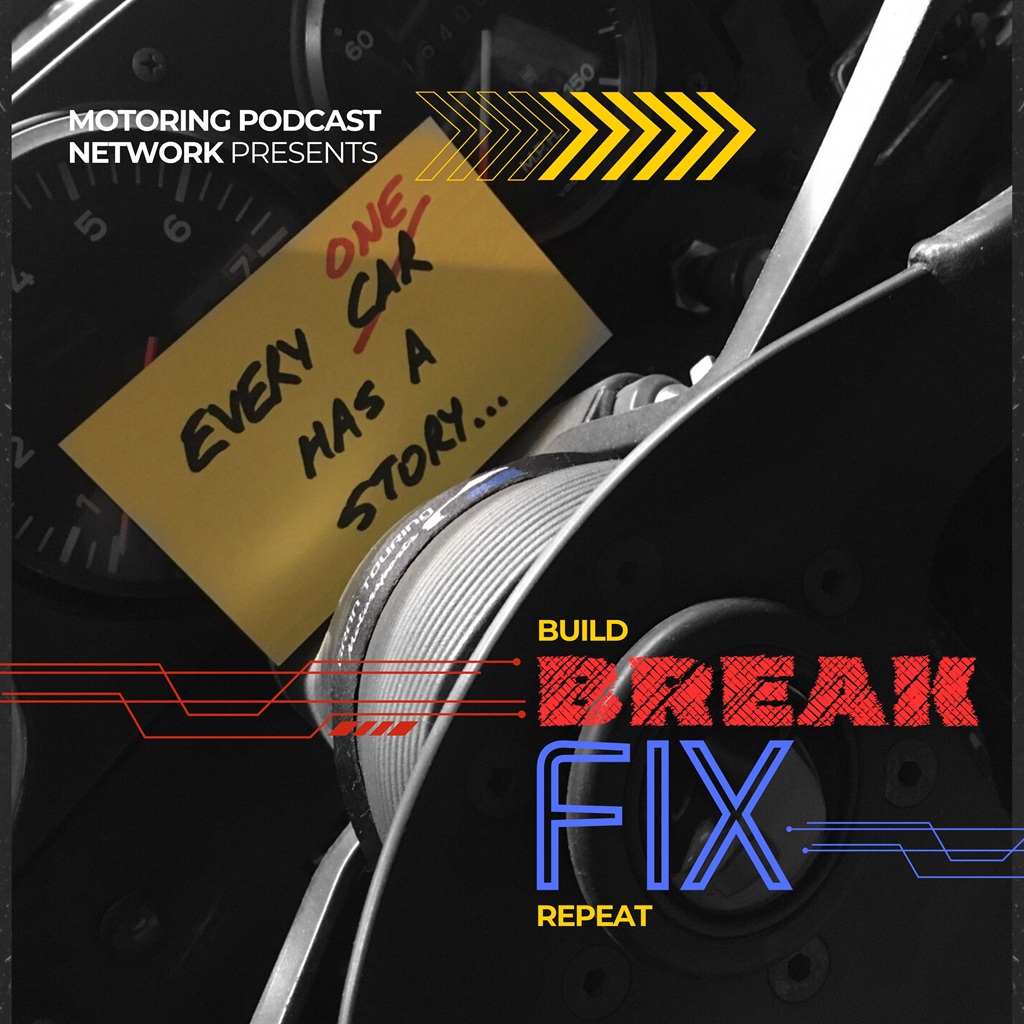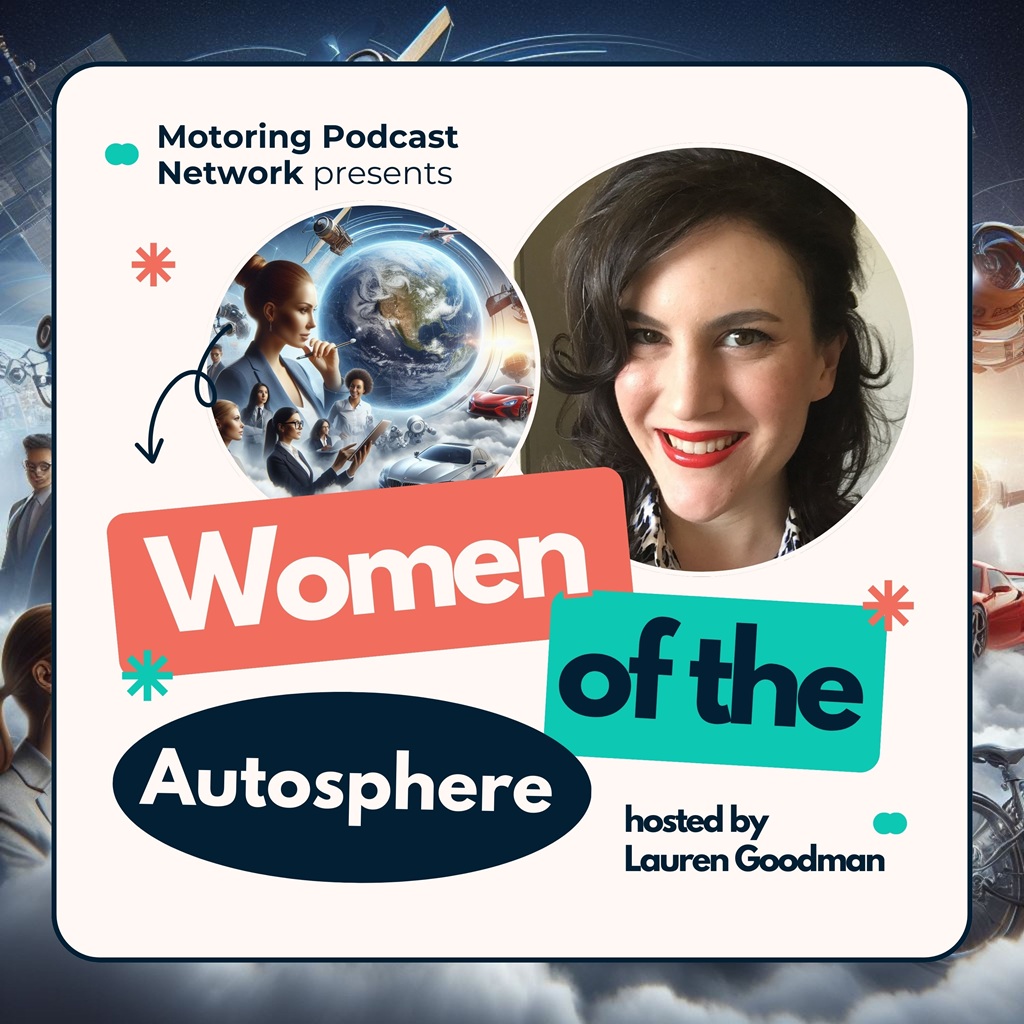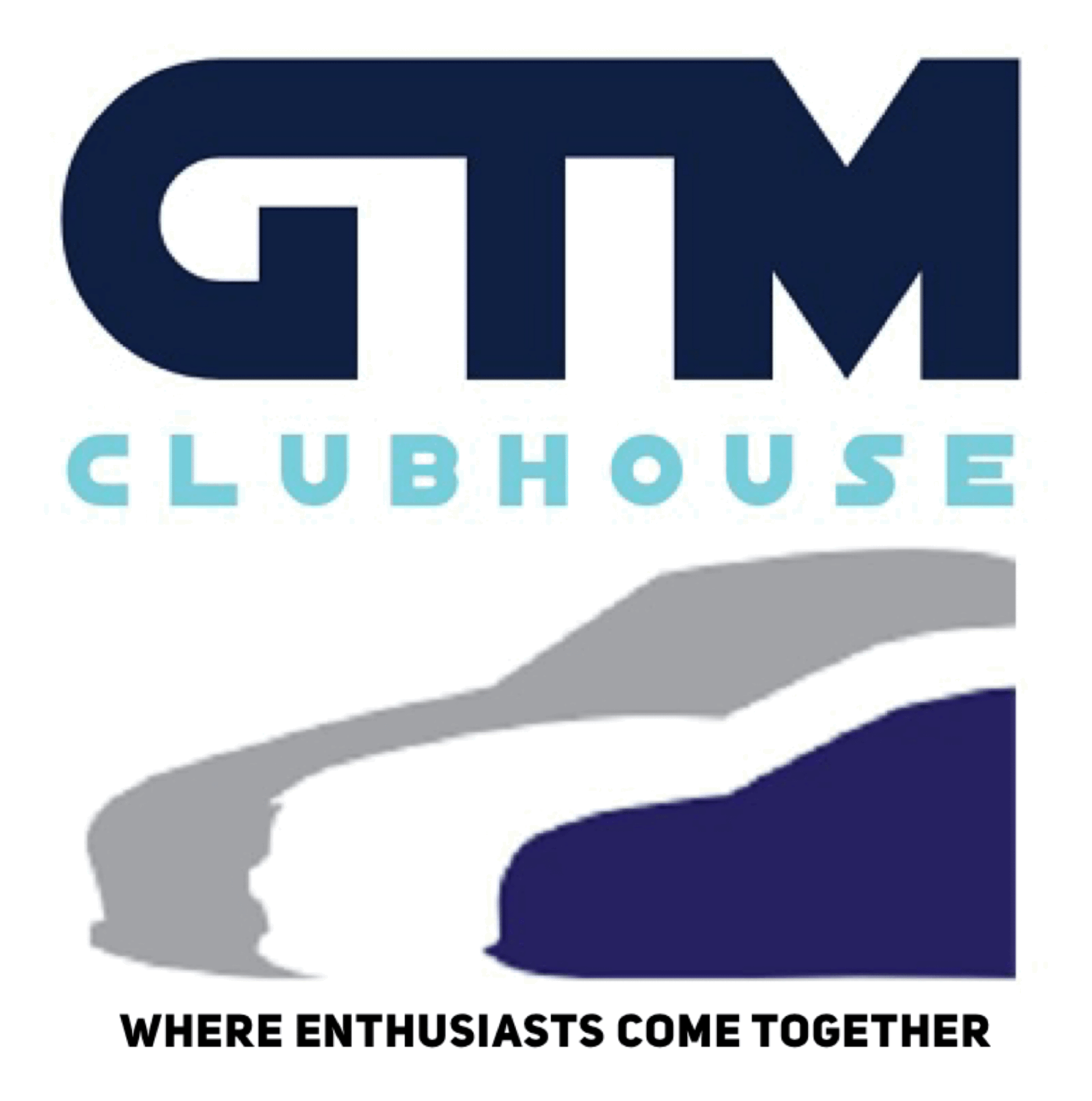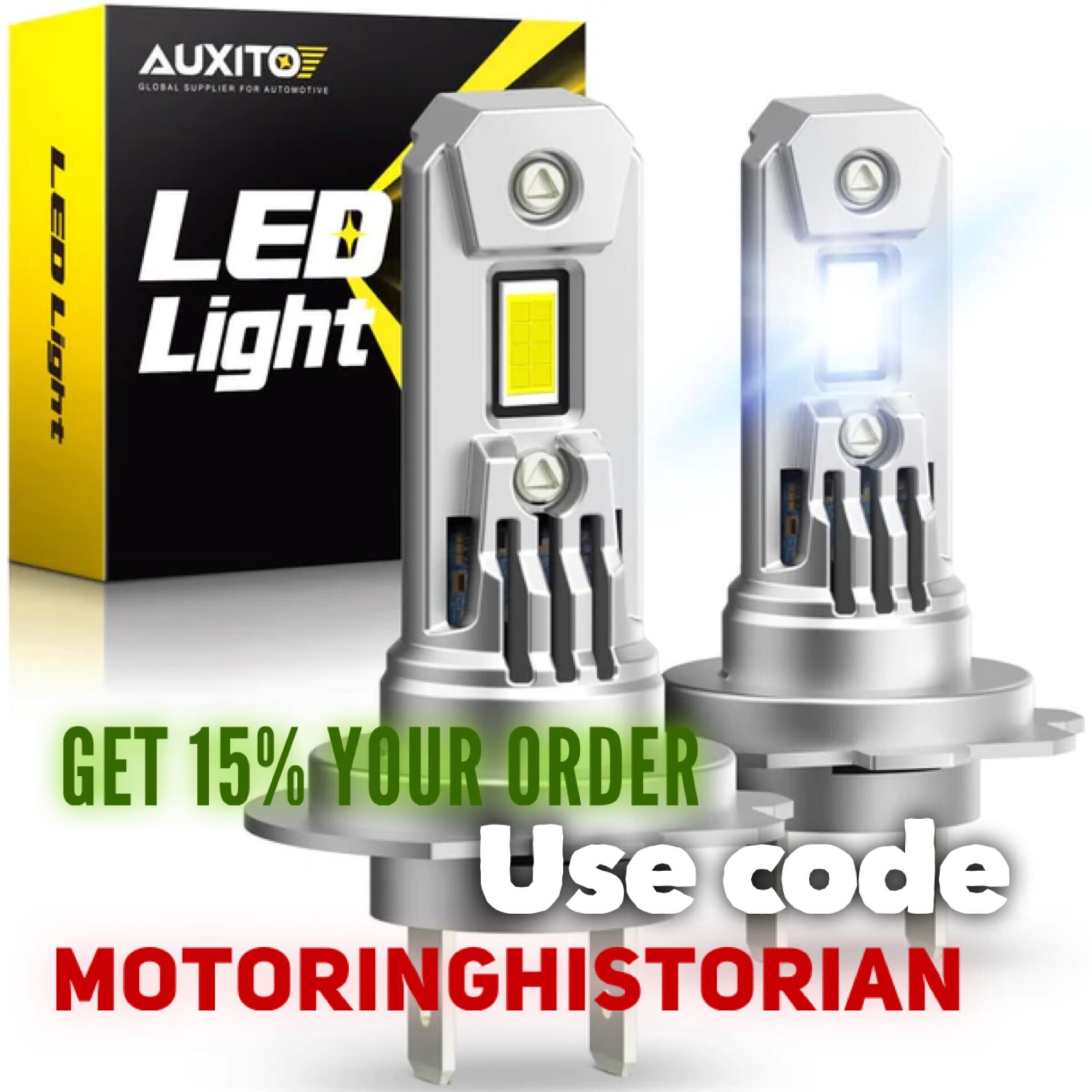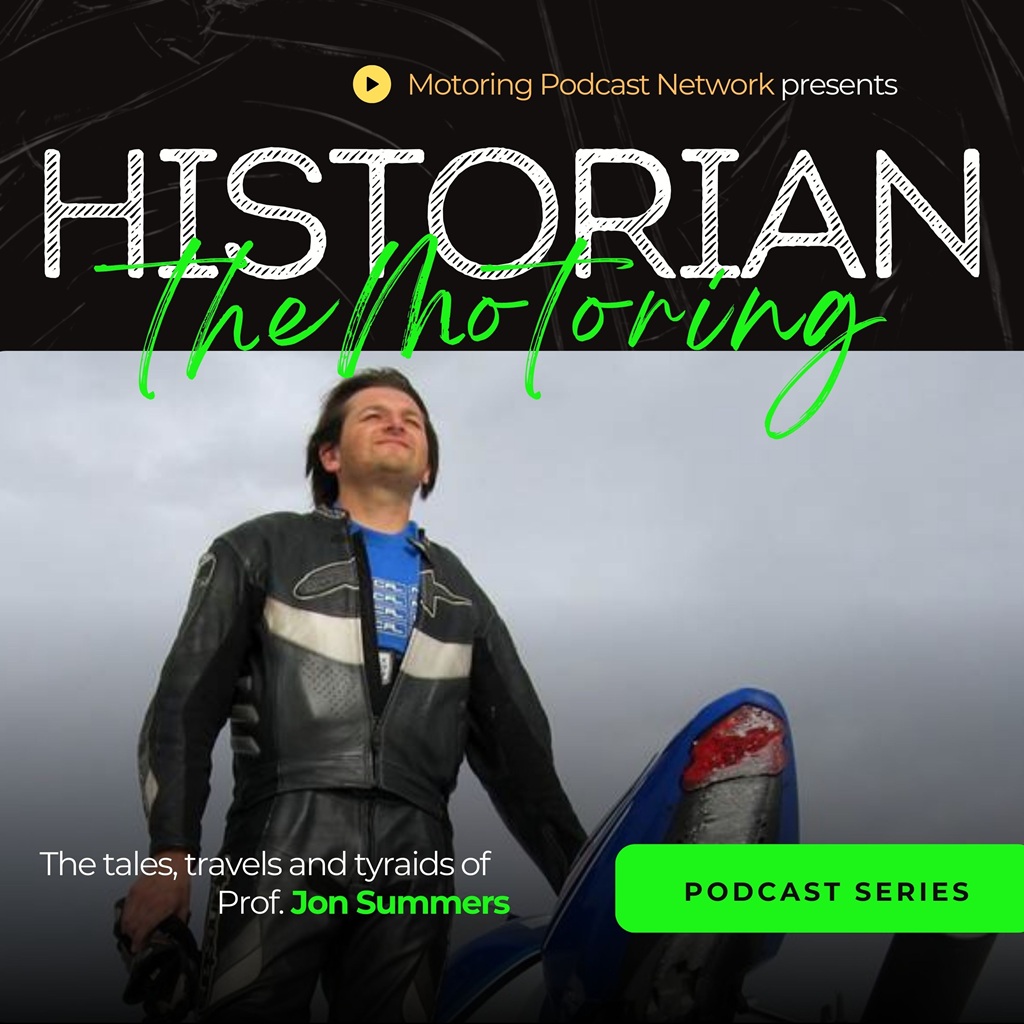Part 1: Our guest tonight began his career in the automotive industry in the early 1960s, when he started importing small cars from Europe and Japan to sell in the United States. In 1968, he founded Subaru of America and helped to introduce the Subaru 360 to the American market. In the 1970s, Malcolm Bricklin turned his attention to creating his own sports car, the Bricklin SV-1. The car featured gull-wing doors and a fiberglass body, and was powered by a V8 engine. 2,854 units were sold and production ceased in 1975.
Tune in everywhere you stream, download or listen!
 |  |  |
Part 2: Today, Malcolm remains an active and influential figure in the automotive industry, continuing to explore new ideas and business ventures in pursuit of his entrepreneurial vision. And he’s here to explain to us just exactly what he’s been up to! Picking up where we left off in Part-1 (above) of the story, we were somewhere in the mid-late 1990s approaching the start of Visionary Vehicles. Malcom talks us through, how/why he started another car company?
Tune in everywhere you stream, download or listen!
 |  |  |
- Spotlight
- Notes
- Transcript - Part 1
- Transcript - Part 2
- Highlights
- Learn More
Spotlight
Malcolm Bricklin - Founder & CEO for Visionary Vehicles
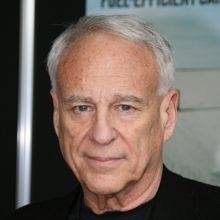
Meet The Bricklin 3EV - Redefining the Price of Fabulous - Pure Electric. 100% Electrifying - with a 275+ Mile Range. The 3EV is the leading edge in three-wheel, fully-enclosed, two-passenger, zero-emissions, eco-mobility personal transportation.

Contact: Malcolm Bricklin at Visit Online!![]()
![]()
![]()
Notes
- Growing Up in Philly – I can’t think of too many automotive titans that have their origins starting in Pennsylvania other than Lee Iacocca – What sparked your interest in cars? What was the path or paths you took to get out of PA and into the industry?
- Why Subaru? Why not other brands, like Italians or French? What did you see in them?
- What was the catalyst that made you say “I want to build my own car”
- Why gullwings?
- The Corvette was the only car at the time made from Fiberglass… Did that influence the SV-1 design?
- Why Canada? How does the SV-1 story end?
- Why start another car company? What was the driving force there? What were your plans for VV?
- Let’s talk about the new car: The Bricklin 3EV – specs, details, etc that you can share. Why 3 wheels? Where did the design come from? Are there advantages/disadvantages?
- What’s next for Malcolm Bricklin?
and much, much more!
Transcript - Part 1
Crew Chief Brad: [00:00:00] Break Fix podcast is all about capturing the living history of people from all over the autos sphere, from wrench, turners, and racers to artists, authors, designers, and everything in between. Our goal is to inspire a new generation of Petrolhead that wonder, a. How did they get that job or become that person?
The road to success is paved by all of us because everyone has a story.
Crew Chief Eric: Our guest tonight began his career in the automotive industry in the early 1960s when he started importing small cars from Europe and Japan to sell in the United States. In 1968, he founded Subaru of America and helped introduce the Subaru 360 to the American market.
Don Weberg: The 1970s, Malcolm Bricklin turned his detention to creating his own sports car, the Bricklin Ssv one.
The car featured Gulling doors and a fiberglass body and was powered by a V engine. 2,854 units were sold before [00:01:00] production ceased in 1975. Today, Malcolm remains an active and influential figure in the automotive industry, continuing to explore new ideas and business ventures in the pursuit of his entrepreneurial vision.
And he’s here tonight to explain to us just exactly what he’s been up to.
Crew Chief Eric: Thanks Don. And with that Malcolm, welcome to Break Fix.
Malcolm Bricklin: Uh, well thank you very much.
Crew Chief Eric: So Malcolm, like all good break fix stories. Everybody has an origin. So let’s talk about how you got into this whole automotive industry growing up in Philly.
I mean, personally, I can’t think of too many automotive titans that have their origin stories starting in Pennsylvania other than Lee Iacocca. So what sparked your interest in cars and what was the path or paths you took to get out of Pennsylvania?
Malcolm Bricklin: Here’s the story. Once upon a time, I decided to move my family from Orlando, Florida, where my wife and my first three kids, a one year old, a three-year old and a five year old, decided we’re moving to Philadelphia where I was born and lived [00:02:00] till I was 10 years old, but I had relatives there.
I don’t know why I decided. I said, I’m, let’s do it now. My wife at the time was absolutely not interested on getting on an airplane. And we happened to have a Corvette with a hatch bath. So picture three kids in the back of the thing and a U-haul it, and of course they truck with all the furnitures coming behind it.
I traveled from Orlando, Florida to Philadelphia in a Corvette with my wife and three kids, three little kids. All right. How fun is that? So now we’re in Philadelphia and one of the people I get introduced to is a man by the name of David Rosen, who owns Coin operated machines, cigarette machines, jukebox, you name it, that kind of stuff.
He an old to me older man. I was in my early twenties and he in the worst way wanted me to, and I was not interested, but I used come by and have some coffee and we talk about stuff and one day he said, I got something and I think you’ll be interested in it. What is that? It’s a C Box machine. What’s the C Box Machine?
What it is is a big thing that looks like an egg painted red on the back, on the shell part. And the front [00:03:00] has a television set and it’s a jukebox. The television set. So now it’s M T V before M T V and we go to Corin, where we meet the Innocente Corporation, Innocente Corporation, big equipment, heavy presses.
Almost every car company had one or two or 10 or 50. And they also did Morris Minor with their license from England and they did, uh, Loretta Motor scooters and they were building this C Box machine, which they thought was going to be a big deal. Everybody who saw it thought it was a big deal. It was one little flaw, but we didn’t figure it out yet.
We ordered a dozen and they come, and then we realized we don’t have film. This is not M T V, we don’t have a platform to get any film. And without film, we don’t got a jukebox that chose film. So I went off to Hollywood to go get somebody to start paying attention. What a good idea. This is gonna be everywhere.
Well, they didn’t think so because nobody was gonna give us a hit team of any musicians that are gonna do it. And I got 12. That’s my distribution 12 and I’m never gonna get past 12 unless [00:04:00] I get somebody to do something and it’s gotta be more than one because you get bored pretty fast. The only solution to that was my guy who had all these pieces of equipment and also had a lot of R-rated film, which of course they like seeing in bars and I like seeing ’em too.
I just didn’t feel like being in the business. So I bowed out. But before I did, I got rid of the 12 with a company called Food Fair that was a food store that was popular in at least the Philadelphia and New York area. And I convinced them they ought to put these machines. On top of the checkout counter have the people who are selling their products, put their commercials in there, pay ’em, whatever the hell they can get from ’em.
And when people are waiting in line, they may see something they like and they go get it. That’s what point of sale advertising. So I got rid of my 12 and they seemed to like what they had, but that was the end of that program. Now I am sitting home on a Sunday, having a Sunday breakfast with my three kids and my wife eating a lox and bagel, as a matter of fact.
And I get a call and it’s from in corporation and in Medium English. [00:05:00] They tell me they want me to get on a plane tomorrow and come to Milan and don’t tell anybody. They’ll pick me up at the plane. I won’t be going through customs. I think that was before James Mo, but it for sure as hell felt like a James moment.
I couldn’t wait. I don’t know why I’m going. I have no idea why the hell they’d call me and why they’d go to all these secrecy, but I couldn’t wait. So I get on a plane and they pick me up and we go someplace and there’s a board of directors and a gorgeous room. And I go, what in the heck could this possibly be?
And they say to me, we have a problem. Okay, what’s your problem? We manufacture ated, a motor scooter. It was very popular one with in the United States because of the movie and all sorts of, yeah. But then mopeds came out and mopeds are now selling in. You forget about scooters are now happening in the United States.
We have 25,000 of ’em sitting in Long Island. Financially, it’s no big deal. I mean, you’re talking about scooters sold for a couple hundred dollars back then they said, that’s not our worry. But for some reason it has gotten out and it’s extremely embarrassing for us and the board. And it doesn’t matter what it takes.
We gotta get rid of ’em and we want you to do [00:06:00] it. And I said, well, you just picked the worst guy in the universe to go do that because I never had one. My parents wouldn’t let me have one. I couldn’t have a motorbike. And you’re telling me I should go help you sell the damn thing. I have zero knowledge except I wanted one.
That’s it. That’s as far as I go. Well, we have a problem. We don’t know Anybody else we can ask? I said, well, I, I’m telling you, you are asking the wrong guy. I would love to do it for, I just dunno where I would even start. Would you do us a favor? Would you go back and go look at the place? We have two guys working there.
Would you tell us what you recommend? Great. So I go out to Long Island. I meet two people who are nice gentlemen from Italy and speak. Broken English. I mean, they’re having a good time, but they’re not selling anything because if you want one, you gotta call ’em up and beg ’em just about if you can find them at all.
So I go back to Italy, I said, I have no other suggestion, but you’d be better off with nobody because it is not the way you sell vehicles in the United States when nobody wants ’em. I said, it’s more of a hard sell, and I, I wouldn’t email where to start to tell you the truth. And if there’s anything I can do for you, I’ll be very happy to do it for you.
[00:07:00] No, no, no, no. You can’t leave make us any kind of deal at all. I’m thinking, what can I say that would let them know it would be stupid for them to pursue me? Not that I didn’t wanna do it, I just didn’t have the slightest idea. So I said, okay, I want $5,000 a week and I want an office in new, a one year contract, no matter what happens.
Okay? I’m going, do you understand? I’m going to go to New York every day. We have an office in New York and we have a secretary, so you can have the secretary in the office. Great. So you know what I’m gonna do? I’m gonna read papers and then I’m gonna go to lunch and I’m gonna go back and I’m gonna try to figure out, I wonder what I would do if I, these were mine and I’m telling you I don’t have the slightest idea now.
Be clear. Okay, great. So I go out and I buy myself a used rolls for about 67,000 new ones. Cost about 29, 30 plus. I bought one for that price off the showroom for, and I got myself a driver. And every morning in Philadelphia, I’d come down in my pajamas with the pillow and my suit and tie in, go to sleep in the back of the rolls.
When they got at the end of the freeway near Dozi Freeway, I would, they would pull into a gator [00:08:00] station. I would go and put my suit and tie, go to the time and life building. That’s where he would park. Hello, Mr. Brooklyn. Now I was living my novels that I used to read. You’d go into a big building in New York and the guy would know who you are.
I go upstairs to the office, a very nice Italian young lady is my secretary, and I read all the papers. Now it’s time for lunch. Where am I gonna go to lunch? 21. A little more than I wanna do stuffing park just because, but right next door is a place called Tch Shores. And Tut Shores had a table, table in their restaurant, a round table, and anybody could sit at that round table.
But when you sat there, you sat there because you wanted to talk to other people. People like Chairman General Motors would get how the real man thinks about things. It was a good place for people to be very comfortable, to ask people of different experiences, answers, questions, or just talk to. It was a very cool place in that regard.
Well, I sat next to a guy that had an office across the street from the office. We were at time and life building because his customer was across the street next to [00:09:00] me, JC Penney’s. He sold furniture. He represented a North Carolina furniture place, and he sat next to me and this guy was a police groupie.
He loved the badge. He loved talking to everybody in the police force. He just loved everything about being a policeman or helping them or being involved with them, or being able to talk to them. After about two weeks after we talked about crap, he said, give me three librettos. I said, great. What? Four? He said, I’m giving them to the New York Police Department.
They’re gonna use it for their meter maids. Okay. I guess for the meter maids, it’s not a bad idea, but I wasn’t sure. But anyhow, it didn’t matter. So we gave ’em three and one week later. It comes in with a letter that says, we have come to the conclusion that this replaces five meter MAs, but rather than fire anybody, we’re gonna be moving them up.
Those that are not gonna be meter MAs any longer, and let them start to become more police women. And we’re very excited. Everything. And we want a thousand. So I work out a commission. I called in and I say, listen, we just sold a thousand. I’m gonna have to pay the man [00:10:00] 5% of the whatever the bill is for that.
Is that okay? Yeah. Okay, good. Can we’re gonna be able to ship it tomorrow. Who do? And I tell him, oh, they’re all very excited. Okay, well, I just sold a thousand things go wrong. A week goes by now, remember, this guy’s excited. He’s making money and he’s dealing with the police. He’s the happiest human being ever happened.
The next thing I got is I need, uh, three more scooters, but four. Well, at that time, central Park was not a safe place to be in day or night. Lot of little petty robberies. Running after people on this terrain was not the coolest thing ever happened. And the truth of the matter is a small wheel vehicle was not the ideal choice.
It should have been a bigger wheel if you’re gonna be running over these rocks and all the other crap. Nobody asked them. This guy is out selling all the time because now he had an end. They just bought a thousand things and he’s getting excited about making money. So we give him three. And about a week later, there’s an article in the paper how the scooter patrol has made a portion of Central Park safe and the police department is buying a thousand.
It’s 2000 we have [00:11:00] just sold and we’re getting credit for cleaning up Central Park and increasing the people who are getting kicked up in their jobs because of the Scoot Patrol. So everybody is about as happy as can be. I’m not doing anything, having lunch and reading my papers. Everything is going again.
Pretty good now. I sold 2000, but enough is enough. This is not gonna happen in every city in America. They made one, two, or three. And that’s a long run to get rid of another 23, other thousand of these things. And I gotta get rid of them because I don’t wanna have to think about this anymore and I’m realizing this is how I’m gonna sell it.
I’m just gonna come to this round table and talk to this nice guy and he’s gonna figure it out. ’cause he just couldn’t make you happier. Then he comes back to me and says, gimme 15,000. Okay, what do you want it for? We’re running an ad in the police Gazette and both people in charge of the park and in charge of the meter maids are gonna allow to put their names on it and their phone numbers.
And you, the police department can call them up and they’ll tell ’em what happened. And we set out all for them brothers. Now I got about, I don’t know, [00:12:00] eight, nine months to go. I got nothing to do, but I’m liking what I’m doing, so I’m gonna keep doing it. But I start reading specifically what’s going on in the scooter world and I find something is starting to happen called rental scooters for $15 an hour, $15 an hour to rent a scooter that cost you maybe $300.
That’s unbelievable. So I go and I check ’em out and I start traveling around a little, and I come to the interesting conclusion that the fallacy in what’s happening is nobody can get insurance. So what happens when you are now renting a scooter that nobody’s been on that has to have a shift while you balance is probably the most dangerous thing, you can probably rent for $15 an hour because you’re gonna get in an accident or you’re gonna drop it on, or something’s gonna happen because you gotta do too many new things.
And where you’re going, you’re going out in the street. And that’s what happened. They rent ’em like crazy and you know, making money. And then somebody would get hurt and that goes down because they didn’t have insurance. So I went, oh, isn’t this interesting? So I went out and I went to State Farm and I [00:13:00] made a deal that I would pay them a dollar an hour for every rental if I decided to get into the scooter rental business.
So now I had insurance and now I had to find a scooter. The world umbrellas that’s over. They sold their factory. There’s no more them in there. I gotta find a scooter and I’m reading my paper. And in the Wall Street Journal, it was a little thing about a guy in Boston who was 450 rabbit motor scooters that are on rental, but he needs a $75,000 guarantee.
And the story was he was overdue to pay a 75,000 loan to New England Merchants Bank. That was an S B A loan that they guaranteed but is now due. So I fly to go see him and his story is he makes a fortune renting the scooters out because they have an automatic transmission. Oh my God, I have insurance and an automatic transmission and he rents ’em out.
But now come fall or winter, you gotta put ’em in storage. It ain’t so good. Rent those things out in the snow and the ice and the other. So one, he has to pay for it instead of an income coming in. [00:14:00] He is the distributor for the United States. So he has parts he has to take care of warehousing, and he has a airplane that he loves.
I say, okay, let’s go to the bank. We go to the bank and I say, listen, I’m willing to make a deal. I’ll guarantee the 75,000. If it’s not paid off and what we’re gonna do, then I’ll personally pay it off. I tell him he can keep the airplane and he keep the 450 scooters too. I said, all I want is the new inventory you have, and all I want is the parts which I’ll take care of and I’ll guarantee the loan.
And he was a happy camper. Oh, and what other little condition? The contract you have to bring him into the United States has to be assigned to my company. Call me when you got that. Bank calls me, we got it. And I come in and sign the note and I proceed to put together a little package to sell a dozen of these things to gas stations because they have the cash to put in it.
They have the people to fix it, they have the location to rent it from it. None of that do they think cost them any money. So it’s all profit as far as I’m concerned. And there were a lot of people who owned their place so they could borrow against the place. And it was an inch in cash. No, by the way, we got insurance.
You don’t have to close in case you got an accident. So we had a couple [00:15:00] hundred of the thing and I sold em out in about a week. Now I need a whole bunch. I find out the address and I buy a telex machine and it telex the Fuji. Things are really good here. I wanna come over and talk about buying your whole supply of scooters, and I’d like to show up and they tell me, excuse me, who am I?
Didn’t they know that they are not building these scooters any longer? They sold it to Israel. I go call up the bank and say, excuse me, I have a small problem here. Oh yeah, we knew all about it, but we figured there wouldn’t be a problem You. Now let me go find out what I can talk them into is what I got.
So I got myself a ticket and I said, I’m coming over because we have a small problem here. I was told we have a contract. So now they’re on the defensive right away because, oh my God, United States, this is 1967. Everybody was cautious. The United States was a big, scary place to be from. So now I came over and I just had all my presentation, why I can sell everything.
Whatever deal you make, I’ll pay for it. I’m telling you everything you make I can buy, I’ll give you letters of credit [00:16:00] for it. And they then took me in their style to show me everything. They build up all over Japan. They build planes and they build cars. I was getting a little uncomfortable here. They were so nice.
Now, they were being nice because first of all, they thought I came from Mars. I had sideburns down to here. I had Peter Max ties and double breasted suits, and I’m 20 something years old. The youngest guy there is 50 something and they’re wearing gray and gray and gr and here I come waltzing in there with buy everything.
With my waving my hands around, they show me everything. And I see the bigger car and I see the little car, and I stole prices. Six 40 bucks and it sticks in my head. Boy, I’m sure I could sell that, but I didn’t want that. I wanted the bigger car. Now this is the only two other cars with Toyota and Datson out there.
And they’d come back and the quality here now was at this moment superlative. You could smell it. It looks so everything they we’re doing. So I think I’ve convinced ’em to open the factory ’cause they shake their head a lot us. So I forgot. I didn’t know that us so meant we understand not, yes, you got a [00:17:00] deal.
So I go back happy as can be. And two weeks later I got told really sorry. And they showed me the factory and it wasn’t being dismantled. So they weren’t lying to me at all. Okay. I can’t convince ’em, I can’t believe I didn’t convince ’em. So I said, okay, I’m coming back to talk to you about the little car.
And I fly back. Now they have a problem. What do they do with me? I have been very nice. There have been no threatening about anything. They’re still nervous and uh, they say, okay, we’ll be happy to, we don’t think you can sell ’em in the United States. You know, people are too big in the United States for a small car like that, ba blah blah.
They said, yeah, I know I fit in it. And I was a little bigger before I started shrinking over the years. But I fit really comfortable. I could put a hat on and sit in a silver stick. It was really well engineered.
Don Weberg: Malcolm, you’ve often said you didn’t know anything about the car industry when you brought Subaru over.
Right? When you go into that, I don’t understand. How is it that some guy walks in off the street and says, Hey, Subaru, that looks like a cute little car. I could sell those and brings them in here with the same alacrity of say, oh, I don’t know. I’m gonna import trash cans. I mean, how do you do that? That’s a major, [00:18:00] major step.
Malcolm Bricklin: Well, here’s how, if you saw a little car that you could sit in and be about six foot six in this little egg car, and it was cute as can be, and it had another interior and white wall tires and a radio and tinted glass, and you could buy it for 640 bucks, F o b Yoko helmet, and you know what? I’ll bet you I could do something for 30 or $40 a month.
I’ll bet you I could do something. And they wanted a million and a half dollars because the next year you start meeting the federal regulations. They ordered to meet ’em. They, and they never would’ve met ’em. But besides that, of course I’m not giving them money. I’d never been in the car business. I don’t remember even buying a car.
Somebody already leased it for me. He gave it back to them. And so I had the least experience in retail. What I learned was how the world works in the import world. And I was able to get whatever the hell I wanted when I wanted a country or a car that I thought I could do something with. And I learned how to make sure that met all the regulations.
Crew Chief Eric: To dovetail off of what Don said. He said the Subaru was a small car, it was cute, whitewall tires, radio, all this kind of thing. But in 19 66, 67, 68, there were a lot of choices there. You had the [00:19:00] Fiat 500, the Mini Coopers were out the Doche Vott,
Malcolm Bricklin: well wait, wait, wait. Not in 68. In 60 out the Honda. No, not the Honda.
They came in fourth. The, uh, Datson and the Toyota had had a bad reputation. They came in a couple years beforehand. The quality was really funny. That’s when Japan was known for funny quality. But the year I brought the Subaru in is the year Japan changed from having ah, To incredible the highlight of the world on quality.
I have to correct, not correct exactly, but add onto something that just annoys me when I read it incorrectly. Everybody goes from, I brought the 360 into the United States. We were selling like crazy and consumer report killed us. Oh, it was terrible. It was unsafe because we got here without having to meet the regulations.
’cause it was under a thousand pound. That wasn’t my first choice. My first choice was I wished I’d gotten the front wheel drive and then the all wheel drive that they were developing, but they didn’t wanna give it to me. So they said, okay, finally. And this was to put [00:20:00] me off, give us a million and a half dollars and we’ll converted to meet the regulations for 1968.
I said, wait, stop. Let me go find out about the regulations and I’ll be back. And I fly to Washington. I go to n Gimme the rules on the regulations that come out next year. They gave a book about three inches stick and I started reading the first couple pages and I put it down after myself. I don’t understand what heck I’m reading and I’ll never, this is not the way to go.
But I go to the first page and it says, these regulations apply to all cars over a thousand pounds. Curb weight. Back in, excuse me. What’s curb weight? Oh, that’s all the fluids in your car when it’s sitting at the curb, your air conditioning fluid in there, windshield wiper fluid and your gasoline sitting in.
But the brochure says nine 60. How fast can you change the law? Here’s how it works. First, we have to have a lot of complaints. After we have a lot of complaints, then we have to have hearings. After the hearings. If we decide to make a change, it takes two years. I said, what I’m hearing is no matter what happens, I got two years.
No, what you’re not hearing is you probably got, [00:21:00] maybe never will we change it, but at earliest, if everything went really terrible, it’s five or six years. No kidding. What do I do? Take that brochure down to the I R S, they’ll give you an exemption. So I do, and I now have a paper that says the Subaru 360 I bring in does not have to meet the regulations.
I tell ex Fuji and said, I’m coming over with one of my team and I had no team by the way, and I hired a guy that was 55 years old. His job was to be old. Don’t open his mouth, don’t say anything, just be old. And we go there. It was snowing in Tokyo, which was a big rare deal. So now I go there. I had asked for the board to show up, they have the board there.
And I said, listen, I wanna tell you a thank you all for your incredible hospitality. I know you were just trying to appease me because he didn’t know what the liability is. You have no liability. No matter what happens today, you have no liability. You had nothing to do with it. It was a defrauded by the bank.
And even that didn’t actually hurt me and brought me here. So as far as I’m concerned, thank you. It was really a pleasure [00:22:00] meeting you. But I didn’t tell you one thing and I tried to not, but I’m going to, In the United States. I’m very powerful politically, and I know you think I’m full of shit because I’m too young for that.
So here’s the deal I’d like to make. And by the way, I’ll give you a thing in writing saying you have no liability to make now or any date from here down. I said, if I have what I just said, I have from the United States government, you tell me you’ll gimme the car. ’cause you don’t have to meet the regulations.
So you don’t need the million and a half dollars, they said. Absolutely. And I pulled out the paper. Subaru of America was born and we did all that and met all the regulations in 14 months. And they gave me the little car figuring I’m not gonna sell that many anyhow. And they would make nights. I figured if I brought the 360 in, they’re gonna have to gimme the bigger car.
’cause I’m setting up Subaru dealers. You can’t set up two sets of Subaru dealers. Well, what happened was right in the middle of it all consumer report in effect, killed us because all the banks read it and they cut off the floor planning. So now I had no car, but I had plenty of cars coming in [00:23:00] on letters of credit.
One I had to get rid of them, and two, I needed the bigger car. So I went to Japan and I spent a week with everybody telling me no. And I had a meeting with the chairman of the board as my last resort at dinner and the next day I was leaving because I didn’t know what else to do. They, everybody said no.
They were polite. They listened to the story of why, how important it was, but they said no.
Don Weberg: Are you still involved with Subaru?
Malcolm Bricklin: We got a contract. We asked for a perpetual contract because that would get us when we came back, millions of dollars from an investment banker who said if we came back with a 25 year contract, we would have the money with the contract.
So I decided to push it and say, I’m coming back with a perpetual contract. Well, they didn’t want to even hear about that, but because I got it with the chairman of the board, changing his mind, it appeared as if we had more strength than we had. And so after all sorts of incredible things in negotiations, like, we’ll give you $10 and we’ll put it in the bank in Tokyo.
And I said, we’ll all go to jail. Because you can’t do that legally when [00:24:00] you’re a public company. So I said that doesn’t go anywhere. Well, how about if we give you the word perpetual, but we, you can’t tell anybody I said we’re a public company. Every year it’s gonna be on the first paragraph of every financial statement we ever put out.
The end of the story is they gave me perpetual, and it was in the front first paragraph of everything that came out financially on the year end report. So now, 20 years later, not right after the 360 started to fail, 20 years later, Fuji Heavy Industries bought out the stockholders and it became a private company.
What’s interesting in my life, I’ve been an importer five times. If you put all the other people in the last century to put it together as zero Hoffman in the late forties, early fifties, sort of got everybody in Europe and they had all the brands, but he never sold brands, you know, two or three BMWs. He sold the companies back to the companies because the truth of the matter, major companies in the car business do not wanna have another importer.
They wanna be the [00:25:00] importer, and they set up distributors. Volkswagen did that, Toyota did that, SHA did that. And then after everybody’s successful, they buy ’em all back. Audibly wonderful prices, as a matter of fact. And two of my Subaru distributors refuse to sell Northeast and uh, new England, and they’re making so much money they have to shovel it.
Two Toyota distributors also didn’t sell and they were offered billions, and Moran is out there having a good time not doing that. So being a distributor is a big deal, but being an importer sets up the distributors, and that’s what I was five times. The least equipped human being on the planet from a car point of view to be.
That was me starting off and I got all the distributors because I didn’t know how or what dealers were the best in the area, and they did, and I made them buy stock. Split 10 for one went to 300. Every car we sold, whether it be a Brooklyn or a Hugo, made money as a dealer.
Don Weberg: Why Hugo
Malcolm Bricklin: and the Hugo from Yugos Savia, that was about as bad a factor as you’ll imagine in the world with grease.
About a foot and a half in the [00:26:00] first piece of equipment was a quarter of a million dollars to get a machine to clean the grease off the floor and everybody smoking and putting in the cars and of course that burns everything in there. Had to get the not to smoke and they were welding without goggles and burning their eyes out because on top of that, they had 50,000 people in the factory that needed 2,500.
Isn’t that nice? And a hundred percent of the cars that came off the line did not meet our qualifications. So we had to build a little factory outside the factory where our people did it, and then clean the rust off the trucks to the trains and take them, pave the ports into the port, bring in unleaded gas ’cause they didn’t have any, and get ships to go to Yugoslavia to pick up cars, car carriers.
We did all that.
Crew Chief Eric: Alright, there you go. So as we switch gears now, you’re becoming deeper invested into the automotive world, whether you liked it or not, coming from the scooters and through the Subarus and even the Yugos later, how did you get to the point where you were building your own car?
Malcolm Bricklin: Now remember, as I started bringing in these cars, the thing that put me in the worst jeopardy was [00:27:00] consumer report saying it was unsafe.
So I decided, because I’m reading now Automotive news, I’m reading everything I can read about that has anything to do with the world of automobiles because I am now gonna become the expert on the world on how the world works in importing cars, because that’s my new business. So if I might not know about how you fix a car, but I should know how to bring a car in and meet the regulations and deal with the people over there and get the shipping and make sure everything is there and make sure I have distributors that put money into the company that finances them and get letters of credit that stretch out.
So I have five or six months to pay for ’em, even though they’re always guaranteed. So I can negotiate with the banks to get lots of ’em because they’re gonna have cash for a whole bunch of time, on and on. And that I knew better than anybody in the universe. What happened next was unexpected because they wrote this article and all of a sudden floor planning drained up and I was dead.
Now that forced me to convince them to gimme a bigger car, and once I had the bigger car, now everything started to smooth out. There was no more of this craziness. I found a way with a thing [00:28:00] called Fast Track. I built a little track and ripped the cars apart, made ’em into race cars racing against the clock, and people went and paid a dollar a ride that took about 35 seconds and they couldn’t get enough, and I had ’em all over the place until I finally got paid for all my things in a dollar a piece all over the country.
I then met John Doan, who loved the idea, and I said, I’m only in it to get rid of the cars, and he said, he and Penske would love to do copy of it. Be my guest. They did Malibu Grand Prix. So that got me comfortable and friendly with John Horian, who I had great admiration for. So now by getting the bigger car, all of a sudden we’re in a different position.
Now, my executive Vice President, Harvey Lamb, who was actually running the company, company, one of the best managers in the U universe, he came from having a furniture store that his peak sale was, they financed the hell out of it. That’s where he came from. When he would go with me with Japan and tell them the safety regulations.
All the things I don’t want to do. He did fabulously. So it was a good partnership. He was really important, and then he ended up running the company.
Don Weberg: What [00:29:00] was the catalyst that made you say, I wanna build my own car?
Malcolm Bricklin: Because I decided I’m gonna show them a mount not safe. I’m gonna build the most gorgeous, absolute safest car I can imagine with 10 mile an hour bumpers, no damage to the body.
An acrylic body, you could not dent. It would be the same 40 years from the day, and it’s 50 years from the day as good as it came off the line, because it’s an eighth ty of solid paint. You can’t dent it, but you can make a hole, but you can put the hole back in and it just buffet. It’s amazing.
Don Weberg: The Corvette was the only car at the time, made of fiberglass.
Did that influence the SV one’s design in construction? What was the SV one designed to compete against? Was it the Corvette? Was it the nine 11? Who was the intended target? The number one competitor
Malcolm Bricklin: when I was still in the prototype phase in Livonia. The and her grass ended up taking the original design that I had done.
For one, it made it really cool. Hell, and did the clay and all the stuff you do back then took care of the 200 engineers we had drawing. Every day I get a call [00:30:00] from John. He’d already done the Malibu Grand period, and he calls me up and he said, Hey, next time you come into Detroit, let me pick you up. Okay, great.
It was another couple days and I’m there and he picks me up in a stretch Chevy and he says, do you have a problem if I go see what you’re doing with the prototype? And he said, not at all. In fact, you’ll probably know everybody there. I stole ’em all from Corvette. Okay, great. So we go and he spends about an hour talking to all the guys.
He knew all the guys and it looked like he was in heaven. I mean, he loved watching that to me. I thought it was interesting. But I just wanted the car, come on, let’s get done. Let’s get the car. So afterwards he says, let’s go to lunch. Okay, great. He says, uh, Malcolm, what would you say if I told you I would leave General Motors and go to work for you as your president?
I said, John, I’d kiss your ass in Mason’s window. I don’t know what I’m doing, building a car. I would love it to have somebody like you. I mean you. No, that would be the best.
Crew Chief Eric: You were on MotorTrend, seduced by Speed, a series where you told a story on the DeLorean episode, which fills the gap between the book on a Clear day, which explains John’s departure from gm.
[00:31:00] And when he started, the D M C
Malcolm Bricklin: said, well, I leave General Motors, I’m gonna lose 1,000,006. I said, so you’re saying 1,000,006 buys me a quarterback, John, get your lawyer. Come to Philadelphia tomorrow. You’re gonna meet John Ing chairman of the first Pennsylvania bank. He said, I’ll put up some more in my super stock.
I’ll borrow 1,000,006. He said, you ready to move? I said, you wanna go slower? We can do a general motor style. How about next year you’ll show up and we’ll talk about it? He said, okay. He said, you’re serious? I said, yeah. So next day he met me in Philadelphia. John Bunning absolutely loved the idea. Malcolm, I love this idea.
Oh, Todd, oh my God. Couldn’t be better. I said, so I got the money. Yeah. So everybody shakes hands. John says to me, Malcolm, this is less than 24 hours since I talked to you. Yeah. I would like to keep moving fast. John. Only thing you need outta your head is we’re not moving at general motor speed. We’re moving at my speed.
My speed is you do everything and you get it done and you make decisions and you don’t keep on dragging it out. That’s all the difference. And you know what to do, so it shouldn’t be a problem. No, no. I love it. I love it. He goes [00:32:00] home and about eight o’clock that night I get a call. Malcolm, my attorney and I, we still can’t get over it.
We never heard of something so fast. We’re so excited about it. But he sort of told me that I should get the money after taxes. So I thought about it. I said, John, it’s a couple hundred thousand more. And to tell you the truth, it shouldn’t make any difference at all. I’m still getting you and that’s what I’m buying.
I got a problem. ’cause while I was thinking about it, I was thinking about we’re both sort of narcissists. And I think we’re gonna end up having a fight over whose name goes on the back of the car. And that’s not up for negotiation. So I have a feeling we should back off and see wherever it goes. And he agreed on the phone.
’cause I think he was getting nervous. I mean, he’s lived in a General Motors game and he realizes this is a different game. Completely. Okay. And he knew it was right. He wanted his name on the back.
Crew Chief Eric: Let’s dig a little bit deeper into your relationship with John DeLorean.
Malcolm Bricklin: How about dinner next time you’re here?
Absolutely. We sit down, said, uh, you wanna guess what we’re gonna talk about? I said, there’s no guessing you wanna build a car with your name on the back, Jeff, any suggestions? I said, well, you know ’em all. You need a paint factory. You can’t [00:33:00] afford $300 million, so you better find a material that allows you to not need a paint for, oh, I’ve been building out a stainless steel.
Wow, you can actually do it. Yep. I said, okay, I’m gonna give you a free piece of marketing. Take it for whatever you wanna take it. No matter how good you build anything and whatever color, in this case, stainless steel, once you start building a lot of them, everything loses. Its pizazz and all of a sudden you can’t sell what was the coolest thing in the world.
You can’t just do the same. If you’re going for volume, you going for no volume. You can get away with it. No, no. Stainless steel. We can anodize. You can’t anodize because anodize looks like shit for what people want. They want shiny. Mm-hmm. He said, yeah, you’re right. But I said, blah, blah. Okay, fine. He said, okay.
Last thing. Can I use your prototype in the film you use to raise some money? Be my guest. We have a gray car that’s in some museum I gave it to. And if you put it next to a DeLorean would almost look exactly, which was my permission. They did whatever he wanted to do fine, but took me two years and $30 million.
Took him six years and $300 [00:34:00] million. And the only difference is I had enough sales for four years from dealers who were, were getting deposits from people all over the place. And his problem after 5,000 vehicles was sales because they were bored of stainless steel and he tried to anodize and a looked like ship.
That’s when he got involved in the stupidity. That got ’em all in publicity with just eight. I mean, for a man that is as narcissistic as he was and he, he made me look like a humble person almost. For that to happen to him publicly ripped his insides out.
Don Weberg: Who designed the SV one?
Malcolm Bricklin: Irv bras. What a cool guy.
He was Dolly looking guy with a big shaggy beard and his wife was a stripper and he was just as happy as could be. A great couple really were, and I’m looking for designers in Detroit because I’ve been told that this prototype that I got Bruce Meyers to build for me, it looks pretty close to what I want.
Not one nutter bolt from that is gonna be in the real car that it had nothing to do with being engineer, nothing to do with nothing. It [00:35:00] looked like pretty close to what I wanted. So now I had to go find a designer and they tell me about a clay model. One 10,000 of an inch. It takes hundreds of hours. Oh my God.
And as soon as they pull the plaster, it’s all ruined. So I interviewed a number of designers, and by the way, I work at the office early in the morning, one or two o’clock in the morning. Sometimes I don’t go back. I sleep on the floor, herb grass. He says to me, ’cause I tell him I hardly sleep. He said, well, you can come visit at two o’clock.
He’d probably get me at the office. So one day at two o’clock I show up at his office and I walk into his office and there he is, sitting with his secretary and she’s naked and he is painting her, painting her. Not the canvas painting her and I go and I see him and I say, you know what? You’re just my kind of guy.
You’re hired. So that was the reason I hired her graph.
Don Weberg: It was the seventies. Know? Yeah. Oh
Malcolm Bricklin: no. Let me tell you. He did an incredible job and he did it fast. Remember from the day I woke up and said I’d do it to the day I came off with the false prototype to begin with, with the clay prototype, with all the tilling that had to be made and they shrink at different temperatures.
Oh [00:36:00] my God, what a thing. And it all got done.
Don Weberg: I was always curious, SV one, why go wing doors? Oh,
Malcolm Bricklin: the whole purpose of building the car was to go wing doors to show you how great things come from the silliest little things in the world. I had at the time, three kids. Three boys and on Saturday morning was cartoon time on television and that was a really wonderful time.
’cause they got ’em, they’re almost quiet. They didn’t have to break up fights with all the other happy horse shit. So we would always watch cartoons or various shows. And one of the shows that was on Saturday morning, I think it was called 99 a Space Odyssey, something like that. And every week what would happen is a car would silently pull up and the doors would go.
And that was about 15 seconds of the reel every time. And I went, I wanna build a car that looks like that. I went to doors and go. And that’s why I built a car. It was a cartoon. Well, it wasn’t exactly, it was an actual human show on the moon. Oh, on the moon. And that car was on the moon.
Don Weberg: That’s awesome.
Malcolm Bricklin: But I looked [00:37:00] forward every Saturday to look at the car.
It had trapped me, so it was obviously in my destiny. I mean, I didn’t think of it that way until one day I said, I gotta build a safety car. Car’s gonna look like that. And the go. That was the reason I wanted to build those doors. You understand Where the whole purpose of me deciding to build a car. Now we have all the engineers and all these people who are really car guys and they know they’re working for a guy Jetson, admitted doesn’t know cars.
The way they think. I had to know it in order to do it. So they would try to influence me in lots of things. One of ’em was, forget about the push button going doors. Forget about the window going up and down, because the physics out here and the physics here is way different in the door. Okay. And how much safety you sit as a safety thing.
What if you’re upside down? Oh my God, I said the glass going come down. You’re gonna have a hand grenade pin there so you can pull it and kick if you’re upside down. And.
There’s three ways to get out of this thing. The window, kick out the door, go behind it better than any car you ever had. I said to them, now [00:38:00] I want a push button door. I wanna be able to push it walking to the car and see the damn thing go up, whether the window’s up or down. And they kept telling me, we can’t do it.
We can’t do it. Remember, I’m doing it for the doors and I’m not getting the doors. That’s not gonna happen. I pulled everybody together. I said, here’s the story. I’m leaving back to Philadelphia. I’ll be back next week. If the doors work, great. If not, I’m closing down the. As I’m walking out to the car, one of the kids that works in the place comes out and says, Mr.
Bricklin, can I talk to you? Sure. He said, I know how to do the door, but they don’t wanna do it the way I, I know how to do it, and if they know I’m talking to you, they fire me. I said, no. First of all, you’re not getting fired. Second of all, tell me what you’re talking about. I said, well, just take the hydraulic thing off the convertible and put it on the B pillar, and you got a hydraulic belt and you’re gonna have a glass go up and back.
Nobody gives a damn. The hydraulic will take almost anyway, so I take him and I walk him back in. I said, gentlemen, this young man just told me the following story and I have now given him full charge. I’m coming back next week. If I push a button that the door opens, we stay [00:39:00] alive, and if not, we close it down and if anything happens to the kid, whoever had anything to do with, it was out.
I came back a week later and they had it out there and all I had to do is push the button and it opened up. There was a flock that I didn’t know about until we’re now selling the cars. I am in Philadelphia with a Brooklyn in my driveway with the galling doors up, so I can just sit and look at it, and it starts to rain, so I run out to close the door.
Well, the hydraulics, it takes six seconds to close. That means if I wanted to get in, it would take six seconds to open and six seconds to close in the rain. I’m dead. I am absolutely dead. What am I gonna do? I called my friend Frank Turner, a inventor in Graham, Texas, who’s the genius of the world. I said, Frank, I got a problem.
I don’t know how to solve it. I tell him what it is. He says, I’ll be right there. And he flies into Livonia and he tell, I’m taking one of the cars. I’ll be back next week. And about five days later, he calls me up. He said, I’ll be there in about half a day. I’m already on the way. I said, [00:40:00] and he said, and it’s fixed.
All right, now we come. Everybody comes out there and he says, push the button. I push the button. He goes, push the button and close. It goes, stop six inches above it and closes. Oh my God. That’s perfect. That’s absolutely amazingly perfect. And you can put your hand there. Unlike the hydraulic, it doesn’t go break your hand off.
It’s flexible. Oh my God, what did you do? How much is it gonna cost? How long is it gonna take? The tool? He said, nothing. You don’t have to do almost anything. You drain the hydraulic. I put air in it. The engine makes the air. You got a box frame, air doors end the story.
I loved it. And I loved him.
Crew Chief Eric: So it begs the question, why did John want gold wing doors?
Malcolm Bricklin: Because it’s cool. And I told him, if you build a car and he doesn’t have gold wing doors, God bless him. He’s gonna have to spend a lot of money on advertising. The Gold Wing doors will sell it. People like the gold wing doors.
It makes ’em feel they’re in a really special, rich car. It makes ’em feel rich, it makes it special. That’s why they buy the car. They didn’t buy the Delo and they didn’t buy the Brooklyn for [00:41:00] any other reason is they wanted it. Nobody needed either one of ’em.
Don Weberg: The seventies were seen as sort of a safety era.
There were no convertibles. There were issues with the Pintos blowing up. People were really concerned with safety. You’ve got Volvo and Saab out there. Mercedes is right there too. Was the intent to compete with those companies that were already lining themselves with the safety brand? Is that really where the SV one came from?
Malcolm Bricklin: From the day I woke up and said, I’m gonna build it to the day it came off the line with all the engineers in Livonia, 200 of them, no computers at that time, by the way. I did all of that in two years. Met more than all the safety regulations, and it was the safest car ever built. The Bricklin SV one, ingenious things that nobody ever copied, nobody wanted to do it because you lose money.
If you have a bumper, 10 miles an hour, no damage. That makes you a lot of money. So that’s why the factories didn’t jump on the five mile an hour, no damage. It was $1,200. They were gonna lose a car every time you bumped up the bank. So they didn’t want it. I didn’t wanna make money that way. I wanted to sell you something cool that [00:42:00] my kids would love.
Don Weberg: What did you envision for the future of the SV one? What was the long-term vision where other cars are designed in the work? Was there an ssv two?
Malcolm Bricklin: Nah, nah. The next car we were gonna build was called the chairman’s car. I wanted an all black car, which is a bitch, by the way, ’cause they didn’t have acrylic that way.
But I was trying to talk them into it with all silver trim, and it was gonna sell for $15,000 or something. No big deal. I mean, then it was a big deal and it was going to be called the chairman’s car, not to sell a whole bunch, you know? 50 a month. We were trying to get up to a thousand a month with the other thing to meet this four year supply of Wonders.
We have,
Don Weberg: what was the chairman? Was it a big four door or what?
Malcolm Bricklin: No, same. Same exact car painted, just black and silver. It was no big, it was just a, an upgrade of what you had.
Crew Chief Eric: Sort of like the John Player edition. Lotus’s. Same idea. The black and Gold outfit. Yeah,
Malcolm Bricklin: yeah, yeah. It was the acrylic that was gonna look and the silver everywhere you had the name, it was silver.
Every, I mean silver. So then you know every, the problem was everybody was gonna steal everything we had, but other than that small little problem,
Crew Chief Eric: because [00:43:00] at this time you’re talking about Henry Ford ii, who’s at the head of Ford. So did you also cross paths with Lee Iacocca?
Malcolm Bricklin: Oh, Lee Iacocca. I’ll tell you that story.
Alright.
Crew Chief Eric: You just made my day.
Malcolm Bricklin: You got me into the good stories. I’m about to build the car. I made a deal with American Motors. It’s been engineered with the American Motors four Barrel and we’ve done the 50,000 mile test, which is a royal fucking pain in the ass. And I, I mean, it is seriously a pain. I get a call, Mr.
Bricklin, we have a problem. The order we gave, the contract we have, they’re not gonna sell us yet. Ah, are you kidding me? No. And we just got a call from Berg’s office. I said, well call back the office and tell him I wanna be in his office tomorrow morning. And I get a call now the secretary tell the secretary he would like to see me tomorrow morning, or he can read about it in the paper.
Okay, I’ll be there nine o’clock. So I go there with a couple of my guys. He has a couple of his guys in there and he said, uh, I’m only seeing you because you made a threat and I don’t like threats. I said, no, you de broke a contract. You have a contract with me and I spent [00:44:00] $3 million engineering that car with your engine in there and you’re selling me.
You’re not gonna give it to me. I don’t think so. It’s not the way the world works, Mr. Gutenberg, you’re throwing me out the window. I’m going out hanging on your tie ’cause I’m leaning on your stomach because when I walk out here without an engine, I’m gonna Washington to talk about how the big three had decided they didn’t want me building safety car.
And let’s see how much fun that’s gonna be by not just honoring your contract, you.
It was pretty vulgar. He said, I’m gonna tell you why you’re not getting it. I’ve worked a long time to sell these cars and now I can sell every car I build, and every time I give you an it’s a car I can’t build, never going to happen. I said, okay. Then when I’m in Washington and you can start reading the papers about how you break contracts and how you’re looking to put me out of business, but you’re in collusion with all the other boys out there that they think you’re doing anyhow, then you’ll see whether it was worth breaking the contract with me to sell a few cars instead of keeping a word.
You okay? I’m gonna give you seven engines. Get the hell outta the office. Don’t call me again. Thank you, [00:45:00] sir. I’m sorry if I was rude, but you had put me in a position where you’re putting me out of business and it was really a little bit, let’s say uncomfortable. So please accept my a apology. Get the hell outta here.
You a little. Okay. Now I go back to the office, what am I gonna do? I gotta replace the engine in something that fits and do a 50,000 mile test again. Oh boy. So I walk into the office of Libo and Keith is sitting there and another guy that I don’t know. Come on back, Keith. He said, listen Malcolm, I’ve been asking you to do a story and not only don’t you do a story, but when my photographer tried to sneak into your place, your broke his camera.
Yep. We told everybody, don’t go on our property and start trying to sneak in. We’re not gonna do it. Malcolm, what is wrong with you? It’s Subaru. You knew our value. Did you forget? He said, no, I’m just not ready. I don’t know who you building it yet. I don’t know a whole bunch of stuff. And why would I go premature?
I can’t do anything with it if a lot of people start calling me up. I’m telling you, you’re making a mistake, Malcolm. And by the way, why is House Sperlock in your waiting room? I said, who’s Hal Sperlock? He said he is. I a cook’s right here, ma’am. No kidding. He’s out [00:46:00] there. Keith, tell you what, you got a story.
Gimme a call next week. I’ll give you whatever the hell you want. You can even take pictures as long as we are a little bit clear about what, where we’re at in the game. Thank you so much. And I push him out the door. How screw up comes in. Hey Halal, how are you? Uh, why are you here? Leon Coka sent me. Oh yeah.
How come? Well, he wants to know what you’re doing. Is it okay? Absolutely. You wanna go see it? Absolutely. I am so glad you came. Don’t you have a 3 51 Windsor in Canada? Yep. I need more Canadian content. What do you think about selling Maybe about a thousand engines a month. No problem. I’ll handle it. Great.
I’ll take it down. You can go look at whatever you wanna go look at. He does, and we get a contract. Fast forward, we’ve now re-engineered it. Not a hot, if it fits pretty good, it’s not as good as the American Motor 360. And we did the 50,000 mile test, and now we’re getting ready. It’s Christmas time. I’m in the LA airport with the kids and my wife and I get a call from my secretary.
Ford is not gonna ship us the engines. Oh my God. Here we go again. I call up Henry [00:47:00] Ford. He doesn’t take my call. I call up blue guy Coca. He doesn’t take my call. I call Hal Bur, he takes my call. Now, I can’t believe I’m gonna have to tell you this, but I’ve just been told you’re not gonna sell me the engines, and I want you to know where I am.
I’m in the LA airport, I’m about to get on the plane to fight Acapulco. If I don’t hear back that those engines are coming, like we have in the contract, I’m getting on a different plane. I’m going to Washington, and you know where it goes from there. He said Malcolm, I honestly did not know that they and anybody said that it had to be our lawyers.
And I certainly wasn’t. Let me get to the bottom of it. I said, but you gotta do it really fast ’cause I’m not going to apora. So he calls me back, he said, no problem. You got the answers said What happened? Oh, the lawyers came up with the following scenario, which by the way is not wrong. And they said, what are we doing?
We are selling ’em a thousand engines. If anything happens, we’re liable for what? We’re not making enough money to give a damn. So we’re doing something that doesn’t do anything that has a liability attached to it. We recommend you don’t go forward. He said, we made a deal. You got the deal. Don’t worry about it.
Thank you very much Al. And they, [00:48:00] they honored the deal. Now fast forward,
Don Weberg: how does the SV one story end
Malcolm Bricklin: The deal was real simple from the premier, who I thought was a great premier, his goal of why he financed the factory, which was an old paint factory they gave us that we had to turn into a real factory.
He funded the second part of the money. I put in the money for all the engineering and the prototypes. He put in the money for the factory and he did it because he wanted publicity for New Brunswick when nobody ever heard of. And they all considered they’re fishermen and woodcutters and they didn’t know anything else.
And this would put ’em right out there because this was about as outstanding as anything. And I brought him around with me everywhere TV shows, talking in the Harvard business. Well, he was with me and he loved the attention he was getting ’cause it gave him a bigger stage and a bigger voice. And he was a bachelor.
So we are now friends. They’re putting in money and one day he comes walking in and says, I need three brick ones. Okay, what color do you want? Tells me Where do you want ’em? Tells me, I said, what do you want ’em for? He said, oh, I’m calling an election. First car is gonna pull the crowd. The second car comes in with my [00:49:00] mother.
The third car comes in with me the day after the election. Front page of the papers is a cartoon character of him flying out of the top of a bricklin with the gold wing doors open and him in the Superman, and it says, Premier. Premier win the largest popular vote in the history of New Brunswick elections.
He wins the Bricklin election and I go, oh, I own this province da. Not that I was gonna do anything different, but I liked it. It sounded like somehow it said worked out to my favor. It is what I thought. Well, three months later, premier comes in to say hello with the Can I see your loan, Malcolm? Yeah. He said, I’m closing it down.
I said, excuse me. You do understand we got 46,000 back orders and we got 1200 people making more money than anybody ever made in the province. We’re happy as hell and you’re getting all the publicity ever want. Is that a bad joke? He said, no. Let me tell you what’s happening since the election. You know the one, the Bricklin election?
Well, when I come down every day to talk to the press, there’s only two questions they wanna hear from. [00:50:00] How’s Malcolm and how’s the car? That’s it. They have zero interest in anything else. I sold my political future and voice box because I used the car to win and I won’t. So big. So here’s what I’m going to do.
I thought about this for a long time and I really hate to do it, but I’m doing it. It’s either this or my political career. So I am gonna close you. I’m gonna get abused, but then I’m going to election and a year from now it’s gonna be my election and I’m gonna win. And he did. Everything you just said, and that was the end of that story.
Don Weberg: What did you learn from the experience? What could have been done differently? What would you have done differently? What would you, you know, what would you hope from the Canadian government?
Malcolm Bricklin: So we built that car and we did it inexpensively and we had 46,000 back orders. By the way, I learned that I can for $30 million, That was the penalty of ego.
Don Weberg: It be the great title of a book. The Penalty of Ego.
Malcolm Bricklin: I like that. Yeah. Oh boy. I bet you that kills a lot of people.
Crew Chief Eric: So obviously a lot of years passed from when the Brickland factory in Canada closed and things like that. So take us on a quick journey [00:51:00] between the years 1975 and 2000. What were you up to?
Malcolm Bricklin: Well, let’s see. In the end of the 79, I’m at the first automotive news that they had ever was at the Hyatt Hotel across from the Ford headquarters and Henry Ford was the guest speaker, and the next year I was the speaker. The next John De Hoan was the speaker I had my good friend, Turner. The inventor called me up and says, Malcolm, I need your help.
Anything you want, Frank. He said, I have built a new kind of engine that is beyond revolutionary. He said, it creates a hundred foot pounds of torque and a hundred R p m and goes up to over 7,500 R P M. I said, well, he said, at 500 RRP m I can get 500 horsepower. I got a 500 horsepower, a 200 horsepower, a 20 horsepower engine made on Dinos.
They’ll revolutionize the world. Malcolm U I know don’t know shit about an engine. You can take mine apart and put it back together in five minutes with the screwdriver and a fire. There’s only eight moving parts. [00:52:00] I said, that sounds great. He said, yeah, but I can’t get any publicity or anybody to talk to, so I wanna make a deal with you.
Put your name on the engine with me. Get me publicity. I’ll give you 50%. I said, stop. I’m not taking 50% and I don’t wanna put my name on something that you created That does not feel good, Malcolm. We’re not gonna get any attention any other way. I said, okay, here’s the deal. We’ll put my name on it. We’ll call it the Brooklyn Turner Power Plant.
Good enough, good. I’ll get your publicity. But publicity doesn’t count unless it turns into something. If it turns into something, I want 10%. You’ve helped me all along. I want to be able to say I do own a piece of it so I’m not lying about it. And then I am excited. I’ll be that when I come see it. So I fly down and boy, he puts it on the, the most amazing thing you ever saw a little one about this big as 20 horsepower beyond?
I didn’t know too much about anything, but I, when I saw this, I knew there was had something fabulous. So I called up and account illustrated it. I told ’em exactly what the story was and they came down and looked at it, put it on a thought and went nuts. Put it on the cover of the magazine. The only thing that they did that was hurtful, I thought they called it the Brickland Power Plant on the cover.
They [00:53:00] did call it the Brickland Turner when they wrote the article, but it did not make me feel good. An incredible, in fact, the article was basically saying unbelievable. But we saw it all work. So now I got the magazine, I got the guy, I have the film. That’s what my talk is about in automotive news. And I have a deal with Henry that when I’m finished talking, I go over there and say hello for a half hour.
I get finish my speak. I take the little engine and my wife at the time and we go up to the 14th floor to go meet Henry. Now the 14th floor was Henry’s floor. That was him. He had the floor five times as wide as the normal hallway. And everything was so quiet. All the people were men, secretaries wearing gray suits and white gloves.
And Henry Ford’s office was the corner office and I don’t know who the hell they were or the others, but nobody ever seemed to walk out in the hall. So I come there and we sit and talk. And of course my lovely wife, he definitely paid a lot of attention to, I take the 20 horsepower and I hand it to him.
I said, here’s the deal. Everything I’m about to tell you is absolute fact. When you read the article, here’s the magazine, I’m gonna give it to you. You own it for [00:54:00] five years. Whatever you get from it, it’s yours. But you have to promise you engineer it into a car with that engine. Henry, you could own the car business.
Oh, I couldn’t own the car business. Why Henry? He said, because I don’t have enough money. I smile. I said, Henry, you give me your name for a day and a half. I’ll get you all the money you want. Ha ha ha. I like the deal. Okay, great. What do we do next? I said to him, he said, I’m gonna send my head engineer down to Graham, Texas to see it for himself, even though it says it in the magazine.
I want him to come back and tell me. Fabulous. We make a date. I fly down to Graham and engineer is sitting in their office waiting for me. Comes over to me. Can I talk to you, Mr. Brooklyn? Yeah. He pulls me aside. He says, I’m here to invalidate the program. Whoa. Invalidate the program. And then I got it. It was like, what is wrong with me?
I’m asking this man, if it is all the things I say, he has to throw everything he owns away his, his transmissions, his bodies, his tooling, everything because it makes it all different, smaller, blah. The balance. It’s a whole new guy. He can’t do that. If he wanted to, they would fire [00:55:00] him before they’d throw everything their own away and then invest it over here.
And I went, that’s why nobody ever went for the engine. Nobody wants to replace what they got already. It cost him much damn money. And so I said out loud, the next time I have anything to do with an engine, I’m gonna put it in my car. Fast forward, Leon Coca retires. He lives in California. I’m living in Malibu.
I’m building electric bikes with Dr. Malcolm Curry, who had just retired as chairman of used aircraft and did the EV one for General Motors and hated it when they pulled ’em all back and start crushing ’em. And let’s figure out how to build cars and used cars. Well, we’ll put batteries in them. Oh, remember we have lead acid and nickel metal hydride.
That’s your choice. So we use little batteries that came from computers, but we got it really fine if you like 40 or 50 miles between charger. One day I’m driving and I realize, oh my God, what happens when all of a sudden I run out of electricity? There is nothing. Nobody gives a damn about electric cars.
So I tell Dr. Carr, you know what? We made a mistake. We’ve spent a year, so what? Nobody’s gonna buy it. I can’t sell this [00:56:00] crap. I won’t ride it. So he agrees with me and he says, we sat around. What can we do? Does something in transportation electrically? We came up with, and we started the electric bike industry in the United States with a.
To go to Google to see it. So Lehigh Coco is now retired. He is living there. He gives me a call, you know I’m retired, but I hate to be retired. I see you’re building electric bikes. Yep. He said, I wanna be in that business. I said, I think that’s great. I think you’re doing great with it. It’s an okay business.
It doesn’t turn me on by the way. I said to him, what would you like? He said, well, I’d like to know about it. Do you mind could come on over and saying, hi, come over. And he has a room. All four wars are filled with the front covers of him being on the front cover. He was on time thing 10,000 times in news.
I mean, that man really got publicity. So anyhow, we start talking about it and every day, for 30 days, I picked him up. We had breakfast in his house. He had somebody there serving it. And then we’d take, get my car, show ’em electric bikes and show ’em what happens and show ’em where we’re producing it at the Burbank Airport because every there they were looking to [00:57:00] have environmentally clean stuff in their facilities on the air.
Anyhow. So after 30 days, he says to me, okay, you’re saying I can use the guy you have in Taiwan to do the bike? Yeah. And you can get the batteries from Yeah. So I can actually copy anything I want. Yeah. What do I care? He said, there’s a guy who’s working for you. Turns out that guy was married to my first wife, still married to her by the way.
So I hired him ’cause I wanted them to be really happy. He said, can I hire him to be my president? Absolutely. He’d love to be away from me and be his own boss. And he knows everything He. Smart move. So they designed their bike and they do their bike and it’s starting to come in and one of the batteries catches fire and burns out a garage.
So it scares him as it should and he decides to get out of the bike industry. But here’s where it shows how smart this man is. Now he’s read up everything there is about electric and deaths and that and the government and the next thing you know, he is buying used golf carts and converting them to electric and giving them away and [00:58:00] getting $10,000 from the government and it cost him about $2,500 to buy and put this crap together.
I thought. Now there is a smart man that what a great recovery from a burn down. How cool is that?
Crew Chief Eric: So Malcolm, as we prepare ourselves for part two of this episode, when we talk more about visionary vehicles, any spoilers, shoutouts, promotions, anything else you’d like to share?
Malcolm Bricklin: Alright, so you’ve got my good stories.
Now I’m going to tell you something. I’m gonna leave you with it and I’ll give you a hint. I’m going to be building a four door of the car I have right now, and it’s gonna run on a new kind of hydrogen, a liquid hydrogen and room temperature that is combustible but not volatile. We are almost signed with all the paperwork to have it for the United States for vehicles, and I will say no more, and it will revolutionize the world as we know it.
Three minutes, you fill it up and oh, by the way, you’ll get a hundred to 150 miles to a gallon. Unbelievable. But it all works. And I went looking for it. Didn’t expect to find that, but I found it the most amazing, truly changed our world. It comes from [00:59:00] water, nothing’s put in it, and it turns into a liquid hydrogen at room temperature.
I mean, I have already tested this over thousands of people and 99.999 said, how do I buy it right now? But it’s getting better because what we’re about to do, we haven’t even told anybody, and it will change the world we know. How’s that one for a sort of modest
Don Weberg: exclusive? Yeah. Throughout his career, Malcolm Bricklin has been known for his unconventional ideas and his willingness to take risks.
While his ventures have not always been successful, he has remained a respected figure in the automotive industry and a symbol of American entrepreneurship. He has also been the subject of numerous books, documentaries, and articles, chronicling his many successes and setbacks in the business world. If you’d like to learn more about Malcolm and keep up with all the progress over at Visionary Vehicles, be sure to log on to www.vvcars.com.
Or follow him on social [01:00:00] via LinkedIn or Facebook.
Crew Chief Eric: Well, Malcolm, I’ll say this in closing. I’m really looking forward to part two of this story when we get to dig a little bit deeper into visionary vehicles and kind of expand on what you’re doing now. This has been a wonderful walk down. Well, I guess it’s a speedy walk down memory lane.
Thank you very much for all this insight and information.
Malcolm Bricklin: Go to vv cars.com and see the Brooklyn e v three and all that stuff and know, I’m not sure I will open my mouth or not, but I might tell you what we’re really gonna produce for the world. Not that after spending six years and millions of dollars, I found something that does not have to worry about electricity being not enough or that we don’t have enough chargers by about 2 million minus.
And if you don’t own a garage, charge your car. Don’t ever buy an electric vehicle ’cause you will hate it.
Crew Chief Eric: We’re prepared for part two. We’re prepared. Believe me, we’ve got questions.
Malcolm Bricklin: Oh good. Good, good guys. It was a pleasure talking to you.
Crew Chief Eric: Alright, very good. Thank you Malcolm.
Don Weberg: Bye. Thank you.[01:01:00]
Crew Chief Brad: If you like what you’ve heard and want to learn more about G T M, be sure to check us out on www.gt motorsports.org. You can also find us on Instagram at Grand Tour Motorsports. Also, if you want to get involved or have suggestions for future shows, you can call our text us at (202) 630-1770 or send us an email at Crew chief@gtmotorsports.org.
We’d love to hear from you.
Crew Chief Eric: Hey everybody, crew Chief Eric here. We really hope you enjoyed this episode of Break Fix, and we wanted to remind you that G T M remains a no annual fees organization, and our goal is to continue to bring you quality episodes like this one at no charge. As a loyal listener, please consider subscribing to our Patreon for bonus and behind the scenes content, extra goodies and G T M swag.
For as little as $2 and 50 cents a month, you can keep our developers, writers, editors, casters, and other volunteers fed on their strict [01:02:00] diet of fig Newton’s, gummy bears, and Monster. Consider signing up for Patreon today at www.patreon.com/gt motorsports. And remember, without fans, supporters, and members like you, none of this would be possible.
Transcript - Part 2
Crew Chief Brad: [00:00:00] BreakFix podcast is all about capturing the living history of people from all over the autosphere, from wrench turners and racers to artists, authors, designers, and everything in between. Our goal is to inspire a new generation of petrolheads that wonder. How did they get that job or become that person?
The road to success is paved by all of us because everyone has a story.
Crew Chief Eric: Our guest tonight began his career in the automotive industry in the early 1960s when he started importing small cars from Europe and Japan to sell in the United States. In 1968, he founded Subaru of America and helped introduce the Subaru 360 to the American market.
Don Weberg: The 1970s, Malcolm Bricklin turned his detention to creating his own sports car, the Bricklin SV one.
The car featured Gullwing doors and a fiberglass body and was powered by a V engine. 2,854 units were sold [00:01:00] before production ceased in 1975. Today, Malcolm remains an active and influential figure in the automotive industry, continuing to explore new ideas and business ventures in the pursuit of an entrepreneurial vision.
And he’s here tonight to explain to us just exactly what he’s been up to.
Crew Chief Eric: Thanks, Don. And with that, picking up where we left off in part one, welcome back, Malcolm. Thank you. We were somewhere in the middle of the late 1990s. You were talking about Lee Iacocca, electric bicycles, all sorts of stuff like that, kind of leading up to the founding of visionary vehicles.
Talk us through this, how and why did you start another car company?
Malcolm Bricklin: Well, this time I went around the world looking for a car company that would do exactly like I told them I would buy a hundred percent of their production with letters of credit and their job was only to do what I told them. Meaning, go to Pininfarina and Bertone for design, go to ABL for their engines, and let me approve the design that we’re willing to buy.
So I was going to [00:02:00] find a factory that was going to do everything I want, and for that they were going to have no responsibility. Just build a good quality car, and I was going to pay four letters of credit. I went all over the world, and one of my sons, who’s a filmmaker, Live with me for four years. He went everywhere I went and filmed every meeting I had during those four years.
And we had a group that edited in the company, and we sent out what I was doing to their potential dealers. Until we found China. And I found somebody at Cherry who said, I love it. Now, a little history of Cherry. When we got there, they had a brand new factory, but they had built their factory without asking the central government for a permit.
They got away with it because there were people in the province who were a part of the government old timers, and they had a lot of respect, so they sort of got away with it, sort of got away means they were punished. They had to give 20 percent of their stock to SAIC. SAIC was a definite owned by the [00:03:00] government and had Volkswagen and General Motors as two of their partners.
And they had to give 20 percent of the stock and the company was called SAIC charity. That was their penalty. We came there. We made a deal. The deal had two parts in it. We were redefining the price of luxury. We were going to build a car that looks like, feels like, and was a 35, 000 car, but we were going to sell it for 20, 000 to 25, 000.
Everybody was going to make money on it. Instead of a cheap Chinese car. Listen, a beautiful design doesn’t cost you one penny more than a ugly design. It’s just not the way they sell cars. Vanilla is under 30 and it goes up a little bit better as it goes up in price. We said to hell with that. We’re going to give you a great coming in.
Everything, no excuse. They loved it. They loved it so much that when we did our publicity in China, the central government loved that so much that SAIC gave back their 20 percent, it was now just called Cherry, and Mr. Yin won man of the year. We have him on film [00:04:00] saying, oh my god, it was Mr. Bricklin who did this, we went from the bastard tile to the favorite song blah blah blah, and bragged and bragged and bragged.
We brought our dealers to China in groups, they met with the people, they talked with the people, they saw the factory, they saw what we were building, they already had put in the AVL factory for the building of the engines, they were doing everything we said. One of the paragraphs that was in the contract, that delayed us by about two months because I refused to change a word, and they were having a problem putting it in like I said, and it said the following.
This paragraph is not negotiable. It cannot be changed. It is part of our total understanding that you do not ask visionary vehicles to invest in a factory in China. I am in the import business. I am in selling cars, designing cars. I am not in building cars. They got it. All right. Fast forward, we are now going out and talking to dealers and in order to [00:05:00] get a territory, a nice size territory, they had to buy $2 million worth of stock in our company and a $3 billion valuation.
What we had was a contract period that you could verify by going to China with us, we had $157 million in escrow in the bank. When I got notified by Cherry, they wanted 200 million for a factory in China. I told them, read the paragraph. They said, we never read it. We’re not doing anything. We’re just not going to do anything until you give it to us.
We’re not breaking any contracts. I said, you understand the reason? If I have to raise 200 million outside of the dealer’s money, I have to give away control. There’s no way in God’s earth I am going to stay when somebody who knows less than me is in charge because they put up the money. That’s the price you’re going to pay.
And believe me, that’s a serious price because it’s not going to be a success. That simple. No, they want their 200 million. So I said, okay. And the first person that agreed to give me my 200 million was [00:06:00] George Soros. Oh, my goodness. Not my favorite person. I was a little nervous taking his 200 million. But they put it in the escrow.
They wanted 60 days of due diligence. We agreed. And then we were all going to meet in Hong Kong when that was over. And each one of us would either say we’re going forward or we’re not. And so we met after 60 days in Hong Kong, and everybody said we’re moving forward. Everybody was excited, except me.
Friday, Saturday, Sunday, comes Monday, I am in Soros’s office in New York to talk about what they would like to do next before the money goes live. And Jonathan Soros, son of, comes out with his little troop and says, uh, we decided not to go forward. Now, that was four days before they had met in Hong Kong and said, we’re going forward.
I said, would you mind telling me what happened? No. Okay. They said, oh, we’re leaving the money in escrow. When you replace it, we’ll take it out. Now, that was pretty scary because George Soros and I are not buddies. [00:07:00] That’s number one. And that’s his not normal style of doing business. If he’s finished, he’s finished.
Give me my money and I’ll see you later. For him to leave it in there made me extremely nervous. Something of course happened, except that we don’t know what it is. We finally found out under deposition when we sued everybody, which was my second dumbest move, even though we won everywhere. That money went to attorneys and went to expenses for a 10 year suit in every country known to man.
But remember, we had films on every single meeting we had. There was no argument. There was no defense. We said you did it. And here’s you saying it. End of story. All right. What we had to do is go through all the baloney that lawyers make over a period of years that just cost money. We found out that they had made a deal with Cherry.
Brooklyn doesn’t get the money, you know, we’ll take over. All right. So now I have to find another 200 million. So I get introduced to the Afar brothers. Afar brothers, richest family in Israel. If not the number one, number two. Daddy came there when they, Israel just [00:08:00] starting and got the license for everything.
For oil, for shipping, for you name it. And the geniuses, Made a lot of money by having a monopoly on everything and they were not well liked in Israel. That being said, they sent in an ex executive vice president of Volkswagen who had a very bland career. Nothing good, nothing bad, just, it was there. And he came in to do his due diligence for them.
And we filmed everything, of course. And we made them sign everything, of course. Oh, don’t worry, these are honorable people. I said, we don’t care. You’re going to sign everything. You’re going to say everything on film. Under no circumstance, when we introduce you, no matter what the issue says, if we don’t do business, you don’t do business with them for five years.
Selling Mickey Mouse watches, you don’t do business with them. Oh, no problem. No problem. Okay, no problem. So now we fast forward, they’re doing their due diligence, everybody’s happy, they’re all excited about it. The Alford brothers are going to fly in on their airplane to China, and we’re going to have the big [00:09:00] meeting with the executives of Terry for some reason in my 65 years in the car business, this is the only time I said to myself, don’t be at that meeting.
Wow. That is an impossible scenario. For me not to be at the much less important meetings to be like that, that’s not even a consideration normally. But my gut said don’t be there. So I had my vice chairman who was a shipping magnate who arranged all our shipping, who was investor in the company, who they loved because of the shipping and his knowledge.
And he went and about four other of our staff went. Top guys. And in the meeting, the offers said to Jerry, why would you have to deal with the brick home? Why don’t we just go to the right? They said, yeah. And my guy gets up going, why are you out of your mind? We spent 30 million. We have all this, you’re out of your mouth.
And you know, you can’t break the car. And he says to him, come with me. And he takes them. Don’t worry about it. We’ll take care of you. Now, his choices were, do I lose my money because they’re going to fuck us, [00:10:00] or do I not lose my money and find a way to touch him? So he chose to calm down, which I think was a smart thing for him to do.
There’s nothing more he could have done no matter what. And they started offering us all sorts of deals, which were just totally stupid. That was the end of it. And then after about six months, I decided I couldn’t take it any longer. I had a suit everywhere, in Hong Kong, in Detroit, you name it. And what I found was the justice system in this world truly sucks.
Truly, truly sucks. I was once told something by a very wise man when I was much younger. He said, Malcolm, if you’re in the right, don’t sue. You could lose. But if you’re not, go ahead and sue. You might win. And that’s basically where the justice system is. We sued the Israelis in New York, because that’s where we held all our meetings, and that’s where our offices were.
And we had all the film to prove it. And we got venue in New York. They had the most expensive lawyers [00:11:00] in New York City. And for a year, we passed back and forth papers. That the judge asked for, that they asked for, that we asked for, and we had venue. We were waiting for about a week or two, and we were going to have our jury trial started, and we were going to just win billions.
Not maybe, positively, or at least hundreds of millions. We really lost a fortune, proven by the dealers that signed up already, and what they were going to order, and what that meant in profit. Two weeks before we’re ready to go to court, we get an announcement that the other side, the Offer Brothers, have added another law firm to their law firms.
They didn’t get rid of the older one, they added. This particular law firm was a one man law firm. That one man law firm took the judge out for lunch and the next day we lost venue. That’s impossible. That’s impossible. That’s an outright, no question, bribe or threat of some kind.
Don Weberg: Yep.
Malcolm Bricklin: And that was the end of it.
We couldn’t sue anywhere in the United States because of that [00:12:00] judge’s ruling after one year having met you and it being ready for a court case. What
Don Weberg: a surprise. You were probably winning. And the other side couldn’t stand that, so they played dirty pool. Oh no, of course nobody
Malcolm Bricklin: ever fought us. There was no such thing as we were losing.
How could we? We said they did this, and we showed them a film. There they are doing
Don Weberg: it.
Malcolm Bricklin: Right. Here’s what they said. Here’s the film doing it. Here’s what we said. Here’s the film doing it.
Don Weberg: But those guys
Malcolm Bricklin: couldn’t stand losing. It was a cut and dry. There was never any argument on the other side.
Crew Chief Eric: So now you find yourself in the early 2000s with the name of a company, but no car.
So where do you go from here?
Malcolm Bricklin: Visionary Vehicles was a company that was going to do what I had already done five times before, but this time not find a car that they were building, find a company that would build the car I want them to build. That was a major difference. And it took me four years to find this company.
I went everywhere. I talked to everybody. I got films as a chairman and board of Europe and a meeting in Switzerland with us. You name it. I was there. Tata in India. I [00:13:00] went everywhere.
Crew Chief Eric: So then let’s dive into the birth of the 3EV. Cause in part one of your story, you talked about how you got to ride an early EV car.
You were familiar with Dr. Curry, who designed the EV one, things like that. And you didn’t think there was a future in that. And obviously there were issues even with the electric bikes, as you mentioned in the first part of the story. So now you’ve turned your attention to the EV world. Because lithium
Malcolm Bricklin: ion batteries had come to the forefront.
Up to then the batteries were nickel metal hydride or lead acid. That’s what the difference was, and I saw it coming, even though I thought hybrids were the only thing that made sense, with the lack of charging stations and the lack of five minute charges. The only one that agreed with me and stuck to his guns as long as he could was Toyota.
So I played with fuel cells. I played with everything, except the Postal Laboratory. Trying to find what it was, and then came down real simple. If I could give them gorgeous at a great price, I would. That’s the only thing everybody was not doing. [00:14:00] And that’s how the three wheeler got there, when I got desperate and said, How much weight do you save if you take one wheel off?
I expected a couple of hundred pounds. It’s 1, 500 pounds with all the things that adjust to that one wheel. And that was half the kilowatts.
Crew Chief Eric: So let’s expand upon that for a second to get a little technical. So eliminating a wheel saved 1, 500 pounds. How much does the vehicle weigh in total?
Malcolm Bricklin: Our vehicle, when it’s in production, because remember things were made by hand and I put it.
Pieces of steel that won’t be there, et cetera, et cetera. Our car will weigh about 2, 200 pounds. The average car weighs with that battery about 3, 600 pounds.
Don Weberg: Malcolm, what I’m wondering about, you got three wheels, 2, 200 pounds. That is a lightweight car. Now I live in Texas. I live in the land of, you know, big trucks and scary drivers.
I think about a 2, 200 pound three wheel car going toe to toe with a big F three 50. And I think. Where’s the safety in that?
Malcolm Bricklin: Number one is the size of a regular car. It also is the widest you can make a car 80 inches wide. [00:15:00] So I have a wide front end. I got 800 pounds of batteries on the floor. It is the safest car you will ever drive.
It handles. Unbelievable. It does not bend in a curve. It stays flat. It’s unreal. So we made it and we did not have that big ass wheel in the back sticking up like they do in a three wheel car. I mean, it’s like they designed the front end and then they give you a wheel.
Crew Chief Eric: Yeah, like a Polaris slingshot.
Malcolm Bricklin: We have to tell people it’s a three wheel car, but the truth is nobody gives a damn.
They just see something that is extremely exciting, that is way out of their price range. That is not way out of their price range. And that is such a phenomenal piece of information that the people who look at this car, who start off with it, just beautiful. And they want to know about it because they can’t possibly own it.
And then when they guess the price and the average is 115, 000 guests, and we tell somebody it’s 29, 000. It’s like, how fast can I get money out of my pocket to make sure I get a reservation? I want one. This is not a car you need. [00:16:00] This is a car you’ll want.
Don Weberg: It’s a 2200 pounds. What’s the body? Fiberglass?
Malcolm Bricklin: Right now it is, but it’s going to be hemp.
Don Weberg: You’re building a hemp. No kidding.
Malcolm Bricklin: Well, it’s 10 times stronger than steel and it’s light as hell. And I can get three growth. Harvest a year.
Don Weberg: Yeah, you’re taking the Ford approach.
Malcolm Bricklin: They played with it. And of course, Henry played with it for sure. But it’s gotten a lot better since then.
Don Weberg: Is the chassis, the frame, everything is hemp? Or just the body?
Malcolm Bricklin: No, no, no, no, no, no, no. We first are starting from building everything I can to make it the safest car in the world.
Don Weberg: Now, I heard a rumor. Don’t know how true this is, so correct me if I’m wrong. You’ve got some sort of fancy seatbelt situation going on in that car.
Malcolm Bricklin: Once upon a time, I owned the Phoenix International Raceway. It was on wide motorsports twice a year. So the Andretti’s and the Answers, those are the people who raced in the speedway. And I got to know a whole bunch about racing. And I saw that harness belts were kept a lot of people safe in incredible kinds of accidents.
So I wanted to put harness belts in. I wanted to do that in the original Brooklyn 50 [00:17:00] years ago, but I couldn’t because the law says you put the strap in that you see in every car. That’s the way it is. That’s what you put in. I couldn’t put it in the harness belt, even though it’s better. You put it in that way or go change the law.
Well, I got a three wheel car, so I can put whatever I want in there. So I started with the harness belt. I’m putting in the harness belt. Why? I got kids and grandkids. I’m going to drive the car. That’s why I’m with Sandy Monroe and I’m talking about the car and talking about him getting involved in that and he said, Oh, you can’t use the harness belt and I’m ready to give him an argument why I’m going to use it and he says, I designed the belt for the airlines.
Really, it brings out the belt and all it is, is a belt, a regular seatbelt, and you’ll see on the airlines now in the newer airplanes. I’ve already been on the airplanes and seen them. One side is about an inch thick, and when the airbag goes out that’s in that seatbelt, it goes up and down. So it’s a full body airbag.
How cool is that? No [00:18:00] in your face from the steering wheel. This is perfect. That’s what I’m going to use. But if I put one more wheel on that car, I can’t use it.
Crew Chief Eric: And why is that?
Malcolm Bricklin: Because this is a three wheel car. It’s called a motorcycle or an auto cycle. So you don’t have to meet very many rules. You have a seatbelt on a motorcycle.
Crew Chief Eric: I get it. I’m curious, who is this car targeted for? Who’s the audience of a two seater with scissor doors and three wheels?
Malcolm Bricklin: Everybody. Anybody. Who wants to own cool for a really great price is our customer. A Lamborghini guy was right next to me at a light. He started yelling at me. So I pushed the button and the window goes down and said, can I help you?
Yeah. Oh my God. That’s gorgeous. What is it? And then we turned the light on the back cause the name changes colors on the back. And we said, I said, so what do you think it should sell for? Oh, I don’t know. 300, 000. Oh yeah. What would you say for 29, 000? I want 10 of them right now. This is a beautiful car.
My judgment on if [00:19:00] it’s beautiful is if I keep on wanting to look at it and I’m sure as hell no, it is always outstanding. The interior is beyond belief. It makes you feel rich and there’s stuff in there you’ve never seen before in any interior. That being said, it drives unbelievable. It takes corner without leaning.
It’s just. Amazing. And it’s faster than hell. So all that put together is something that 90 percent of the people cannot afford what that represents. That’s an expensive car that you’ve got to be rich to own, except you don’t. And that difference gets everybody who sees it, whether they’re interested in another car, whether they can afford another car, they don’t give a damn if it’s electric, they don’t give a damn if it’s three wheels, they want that car.
That’s all. And that’s what we built it for.
Crew Chief Eric: I’m intrigued. There’s definitely precedent for a three wheel car. Forget
Malcolm Bricklin: three wheel. It’s not a three wheel car. It’s a gorgeous car that’s out of everybody’s price range except it’s not. That’s all it is. Forget about everything else about it. How it [00:20:00] got there is not important.
Nobody gives a damn. This is a Bricklin vehicle. It doesn’t look like, it doesn’t smell like, it doesn’t feel like. This is an exotic car. This is a car of your dreams that you can now afford. Holy moly, that’s it.
Don Weberg: One thing I’m curious about, and this might be a dumb question. The rear tire on the EV3, how do you change that thing?
It’s a bitch. Yeah, okay. So is it like a motorcycle where you’ve got two pieces of frame? It’s worse than
Malcolm Bricklin: that. No, no, let me give you worse than that. I got two front tires that are a different size than the back tire. So if I needed to put in a spare tire, I’d have to put in two spare tires. So I’m not putting in a spare tire.
And what I’m doing is looking around to find anybody who’s building a tire that never gets flat. Not the 50 mile top. I’ll never get flat tire because if they don’t have it, I’m going to sponsor. I don’t ever want to fix the tire.
Don Weberg: What about using a run flat? Is that what you’ve got on there? You’re going to use a run flat.
Malcolm Bricklin: No, no, no, but I want better than [00:21:00] just the run flat. I want a tire that never gets flat.
Crew Chief Eric: Yeah I think he’s talking about like those solid core tires like they use on agricultural equipment
Malcolm Bricklin: solid. Yeah That number one, number two, I want to electrify the doors because they’re a pain in the ass for, I think a lot of people to pick up and lower.
I enjoy them, but I don’t think there’ll be a lot of people that will have the same joy that I have in there. And then I need a soundproof the car because what we do is we hear the tire noise that goes through the two holes where they. Big hinges that anchor the door. So it’s just too noisy for me.
Don Weberg: That’s your prototype car. Your production car will be a lot quieter, I’m sure. No, no,
Malcolm Bricklin: no. Not a lot quieter. It’s going to be.
Crew Chief Eric: As he mouths the quietest. Yeah, that good.
Don Weberg: What’s the range on this? It weighs 2200 pounds. It weighs nothing. You have a full size battery going on in there. The range must be pretty serious.
60 kilowatts.
Malcolm Bricklin: Yeah, yeah, yeah, it gets 350.
Don Weberg: 350.
Crew Chief Eric: Out of 16 kilowatt hours, that’s [00:22:00] really, really good because that’s about a half a, that’s about a half a gallon of gas equivalent. And as an example, my wife’s Pacifica Hybrid, it only gets. 36 miles or so on a full charge. Wow.
Malcolm Bricklin: Something’s wrong.
Crew Chief Eric: It’s a 5, 000 pound van.
Malcolm Bricklin: Oh, that’s what’s wrong. Yeah.
Don Weberg: Malcolm, your battery, what does that compare to? I mean, is that like a Tesla size battery? Is it smaller? Is it, what are we talking about here?
Malcolm Bricklin: It’s bigger than Tesla. Because everybody is not as advanced as Tesla is, and it’s actually LG.
Don Weberg: Oh, no kidding.
Malcolm Bricklin: Well, wait, there’s a but.
We are now talking to various people about building our car, because I do not want to build our car. And whoever we use will have their own platform, whether it’s Foxconn, or anybody else of the 14 different companies we found around the world, including in the United States, who will build cars for other people.
Electric cars, we’re talking about. Magna, I mean to name some of the big names in the game. [00:23:00] They all have skateboards, so whoever manufactures it, we have to re-engineer to match the skateboard that they got, which is not gonna be a big deal, but it is something that has to be done and whatever battery we’re using now, will probably not be the same battery, which I don’t care.
But I have looked at, as everybody who’s in the electric vehicle business has, and they know there are two glaring facts that cannot be ignored. Numero uno, there is not enough electricity. to handle all these cars charging, no matter what anybody says. And they can’t get more electricity as fast as you need.
There are no five minute charges, which makes this an adventure every goddamn time you want to charge the car. There’s not enough charging stations by two million. Forget about your garage. If you got a garage, you can buy the car. As long as you’re not planning on going big trips. And why? You may have enough miles to go to a big trip, but at the end of that trip, you’re talking about Four or five hours for 99 percent of the chargers that are [00:24:00] already out there.
So you got to go, go to sleep someplace. You got to go eat someplace to get the damn car charged. So you can go back. Oh, that really turns me on big time. I got to experience it. I’m in a rental home. They got 220 in the house, but not the one that fits the plug for the charger. So that meant I’m out there testing the car.
I got to go charge it and have my wife pick me up or sit in the car for a couple hours. What a wonderful way to hate your car. I hated my car. I was ready to trash it until I got somebody to come over and got permission from the owner to put 220 outlet that fits my thing on the outside of the garage.
And every time I come home, I just plug it in. That’s the only way to own an electric car. What a stupid thing that is. And when you have the millions of cars coming from the half a trillion dollars that had been invested by all the car companies, producing 300 different models, you are going to find a lot of people hate [00:25:00] their car.
After they own it for the first week and realize that you’re consumed by where the hell you charge this car 24 hours a day.
Crew Chief Eric: So why aren’t we making a shift then in the paradigm here to push EVs towards delivery, transit, mass transit, vehicles that currently now are either diesel or gas that just sit idling all day long, rather than foisting this upon the consumer market that needs to get around with basically unlimited range.
Malcolm Bricklin: That would have been very smart.
Crew Chief Eric: You said would have been past tense.
Malcolm Bricklin: But oh, it’s way too late. Everybody’s going down that road. They’re going off the cliff no matter what. Nobody’s going to stop them. Except I refuse to accept that I am going into a stupid situation. I’ll sell all my cars. I ain’t got no problem with that.
But this is a dumb industry, the way it’s all going. And people are going to fail big time. There’s nothing to stop them. They’re throwing away combustion cars and all those assets and all those sales. So the way I am, I can’t stand for things that don’t make [00:26:00] sense. So I start anytime somebody called me up with any technology that would either make a five minute charge or something else that could make sense, I went and looked at it and never found what I was looking for until I did.
Crew Chief Eric: So do you see the market coming back full circle? Like will ice power plants make a resurgence?
Malcolm Bricklin: With what I have, every car company in the world will continue making the cars they’re making now. It will cost them a little less, but they will have something that takes three minutes to fill up your tank.
The tank will go about 3, 000 miles before it needs to have another three minute refill. And our dealers can go to their house or their business and fill them up. Anytime they want for a 10 subscription,
Don Weberg: it sounds like you’re not on board with the electrification of cars.
Malcolm Bricklin: I’m not on board with that. It’s ready for all the amount of vehicles that they’re going to pour into the market That’s what i’m not on the board for
Don Weberg: now that being said toyota.
He’s the only one right? Yeah, toyota and [00:27:00] bmw They’re going hydrogen. They like that idea. Have you thought about? Doing that with the EV3.
Malcolm Bricklin: Their hydrogen is primitive. It’s all going through fuel cells.
Don Weberg: Did you think about this for the EV3?
Malcolm Bricklin: We will build a four wheel car that will look very similar to our three wheel car and it will run on something that nobody ever imagined.
It already does. It’s not a matter of conversation. It’s a matter of it works.
Don Weberg: Okay.
Malcolm Bricklin: And it’s readily available and nothing could be cleaner in the
Don Weberg: universe. So let’s shift gears. What I’ve been curious about, and you mentioned it just briefly, is the dealership network. How is that working out? Who is going to sell these cars?
Let’s say this. I want to buy one of your cars. Where do I go? How do I do this? What do I do?
Malcolm Bricklin: First of all, my history, whether it be Subaru, Pininfarina, Bertone, Yugo, whatever it is, Modis Operandi was set up as a distributor. Case of Subaru, 14 of them. By stocking the company, they therefore give cash. They set up dealers, the dealers buy stock in the company.
So everybody [00:28:00] has a reason to be successful besides just selling the car. And in every single situation, they all made money on that. So I set up the dealers and I set up the distributors and it always worked and I have thousands of people. Who the fathers I did business with a retired, but the kids are still working and the kids all know the name and the car is something that they know they’ll sell every single one they can get and they know they can bring in traffic and sell all the other stuff they got.
And we encourage that kind of thing soon as we decide on who’s going to manufacture it, then we will sign up our 10 distributors. And they will sign up 50 dealers each in their areas. Now, why do the dealers do the things that I want them to do? Because we treat them one with respect. Because we really respect them.
We really know you need service. We really know you need people. No matter how much you can sell on the internet, it gets to a point people would like to touch the car before they buy it. They would like to drive the car before they buy it. And they would like to know they’re going to get service tomorrow if it breaks down tomorrow.
[00:29:00] Not two months from now they’ll get an appointment. So all these people selling on the internet have a good time, wait till the numbers get big, and they find about what people do when they love a car and they can’t get it serviced. They start hating, and they go with venom, and the more they like the car, the more venom they come when they can’t have it.
And that’s going to start happening to Mr. Musk, who has the money and the brains to figure it out, but he better figure it out.
Crew Chief Eric: So what are your thoughts on the future? of Tesla. Do you think they will be absorbed into one of the other larger companies later on? Or do you see them being around perpetually?
Malcolm Bricklin: Tesla is a success because of Musk. The rest of the companies are not a success because they don’t have a Mr. Musk. They have all the people over here in that building that come from combustion engines. And they’re having to tell people who have an all different outlook on the world and the technology.
They’re not in charge. These people over here are in charge. And these people over here are used to [00:30:00] taking forever to make decisions. So they don’t make the wrong decision. Well, you’re going into a market where everybody’s moving too fast down the road. And they’re just like a bunch of sheep going off the other end.
It doesn’t work. It just doesn’t work. Nothing about it works. If EVs work, all the guys that are sitting in the offices get fired. If it doesn’t work, everybody gets fired. What a great position to be in. I’ll make you a bet that Mary Barra and everybody else who is CEOs of these car companies, sometimes around 2030 take retirement right before the shit really hits the fan watch.
It’s not like we know it and nobody knows it. Everybody knows everything I’m saying.
Crew Chief Eric: So there’s an argument to be made about the majors, the Toyotas and the Volkswagen’s and the Fords of the world. They know how to build quality cars. They’ve been building them for a hundred plus years. No, no, the
Malcolm Bricklin: Mustang cars.
They know how to build combustion cars.
Crew Chief Eric: Let’s delete the powertrain from the equation altogether. It’s not
Malcolm Bricklin: the powertrain, it’s everything. In electric, it’s only the powertrain.
Crew Chief Eric: Right. But do you see a [00:31:00] future where Tesla says, I stopped building a car, this object, and sell the drivetrains? To the Toyotas and the Fords and the VWs of the world.
And now it’s a marriage of the two, right? The fast moving technology with people that know how to build quality vehicles.
Malcolm Bricklin: I’m telling you, the people who build cars come from combustion. It’s a different game in electric. It’s a whole different game in electric. And their electric is moving from whatever the hell they invested in today.
Two years from now, they’re going to have to start changing because it’s going to be a better technology. And then they’re going to be, oh, I don’t know, I got too much invested over here. And then, oh my God, wait till you see what’s going to happen with that nonsense. All right, I’m telling you, it’s upside down, but with what I have found, they will be able to keep their factories open.
They will be able to keep building the cars they’re building, and it’ll actually cost them a little less. And those cars will be cleaner than the electric, so they’ll have both to sell. Electric [00:32:00] over here, and this over here, that’s a three minute fill your tank whenever they want.
Crew Chief Eric: So do you see the R& D that Porsche is doing as a threat to that with their synthetic fuels that they’ve been working on to keep ICE cars on the road?
Malcolm Bricklin: All the crap they’re working on are kindergarten compared to what we got. I promise you, I promise you, it’s something that nobody ever heard of before, but yet it’s everything everybody knows about. It’s crazy. At first they were scared to show the world at all, so they decided to use it, and they’re using it now to build a utility running on it, and we’re going to be using it for vehicles in the United States.
Don Weberg: I can see Eric is thinking about where is he going with this? What’s he going to make it power by? Malcolm, Who’s going to build the, you’re looking for somebody to build the car. It’ll be built here in America.
Malcolm Bricklin: We’re talking to two people that I can’t disclose yet.
Don Weberg: In Michigan. Will it be built in America?
Canada?
Malcolm Bricklin: Mexico? In America.
Don Weberg: I read somewhere or heard somewhere you’re looking to make sure that it’s a veteran workforce. Is that true? Or is that falling to the wayside? It
Malcolm Bricklin: will be heavily veteran. [00:33:00] Yes.
Don Weberg: And
Malcolm Bricklin: we have people who, like Tom Ridge, who was Secretary of Homeland Security, happens to be president of the Wounded Veterans of America.
Paul Buca was a Medal of Honor winner, and he was military advisor for Bush and Obama. Ken Fisher, the Fisher Houses, all those guys are involved in our company, and they are involved because they like the fact that we like To have veterans be building our cars as much as we can get. Why? Because these people are dedicated.
When they do something they love and get paid really well, you got people who are going to build it with love instead of just going to work. And that’s what I want.
Don Weberg: Who is helping you on the backside? Engineering, R& D, et cetera. Is that all coming from the mind of Malcolm? Oh,
Malcolm Bricklin: no, no, no. Forget me. I don’t know anything about cars.
I know everything about the car industry, but when it comes to technical, I listen, but I have people who are better than me that makes decisions on it for me. We have found a way to get the benefit of other people’s work. Like, for instance, do you know how many engineers that are hired to do the platform to get the batteries [00:34:00] and the motors and everything else in the car connected?
We don’t have one of them. We buy the whole thing and go bump.
Crew Chief Eric: So history sometimes tends to repeat itself, and you find yourself again crossing paths with the name. DeLorean. Any thoughts on the new car?
Malcolm Bricklin: Oh, absolutely. First of all, John and I were old friends before he died. John was going to be my president.
I think I told you that story. His daughter called me up and said, Dad told me before he died that I ought to meet with you. He did him lots of favors. I said, absolutely, be happy to. We came out, we had lunch, and now we communicate. She’s really after knowing everything about daddy and building a car or doing something for him.
Whatever it is, she’s out there to do it for John, her daddy.
Crew Chief Eric: Obviously, you’ve seen the new design. What do you think of the DNG?
Malcolm Bricklin: Uh, I don’t know that that’s her. There’s two other people that are building cars that both say they have DeLorean’s rights. And I asked her about that and she mumbled something.
I think she just doesn’t want to deal with the facts. But [00:35:00] somebody has bought it and somebody thinks they own it. God bless them. The one I saw, I thought was beautiful. Do you think Kat’s going to be able to build the car? Who cares? It’s a 175, 000 car. So if you, DeLorean people will buy it. God bless them.
Crew Chief Eric: I think there’s still room for more supercars in this world. I’m all in favor of something else to look at on the road, you know?
Malcolm Bricklin: Oh, I agree. I agree, and it would be nice if everybody started making a pretty car anyhow, but it’s not their sales pitch.
Crew Chief Eric: Too bad. Now we’ve gotten to the point where only one design cheats the wind.
You just put a different badge on the front of it, right? So I don’t get it.
Malcolm Bricklin: They’re still going to have the same problem. You got to charge that car every single day. It’s a different kind of animal. All of a sudden, that animal becomes part of your life, and I don’t want my car to be part of my life. I’m buying it, but they’re not intruded, and that car does.
Don Weberg: In your car, the EV3, you don’t have to charge it every single day.
Malcolm Bricklin: I do charge it every single day. I would dare not charge it. When it pulls into my house, a charger goes in the damn thing.
Don Weberg: When yours is in production, isn’t that what you were saying? It’s going to be powered by something very, very [00:36:00] different that you won’t have to charge?
Malcolm Bricklin: Oh, no, no, no, no, no, no, no, no. The EV3 is an electric car. When we do the next thing, it’ll be a four wheel car. The four wheel car. Okay. Same look, same body. That I learned. When it’s a four wheel car, it’ll be four seats, not two seats. It’ll have all wheel drive.
Crew Chief Eric: We’ve talked about the 3EV. We’ve talked about, let’s call it the 4EV, or the four wheeled Bricklin that will be coming out after that.
But the bigger question is, at 84 years young, what’s next for Malcolm Bricklin? You’re a forward thinking guy. You never stop moving. What’s next?
Malcolm Bricklin: The stuff I’m talking about is next. The stuff I’m talking about will change the world as we know it. We will be able to clean up the world without being abusive, without making stupid rules, without pushing everybody down an industry that doesn’t make a lot of sense yet.
And it can be used everywhere for everything. And it’s a hundred percent clean. And it doesn’t need any special anything but a pump. So I can deliver it to your house with [00:37:00] a pump on the back of a truck and a subscription agreement without a problem. Picture. Hydrogen that comes from water and put into a turbine, and out comes something that you would call hydrogen, but doesn’t have two cells.
It has one, and it’s not on anybody’s chart. They call it a hydrogen, but it’s apparently something new, and here’s why it’s new. It’s combustible in a combustion engine, but it’s not volatile. It doesn’t go boom. In fact, if you pour it on the ground and you throw a match in, it doesn’t light. And it is supposed to get between 100 and 150 miles per gallon, which will cost retail about seven or eight dollars.
So liquid hydrogen at room temperature, it can go into every gas pump, every gas station, put in one pump and can have it at dealers. And you can take your combustion car and convert it. So the 289 million used cars out there, my dealers can start converting to hydrogen.
Crew Chief Eric: I like the chemical properties of that because it’s as safe as diesel in that [00:38:00] same respect.
It’s not volatile. You could throw a match of diesel, it won’t light, but only under compression does it combust. So this is really cool as an alternative fuel.
Malcolm Bricklin: And you can pour it on yourself and you can stick your hand in it, which I have, and you feel the energy. You feel it. It’s amazing. Truly amazing.
And all that comes out of course is paper. And I promise you, when you see the four wheeler and you see what it’s all about, it’ll be the first car on your list you’re going to want to have. That’s a car I want to have. That’s a car that you brag about the fuel, it doesn’t control you. And that’s the most important part of this whole damn thing.
That’s what I was looking for, and I found it, and I couldn’t imagine. I never thought that that’s what I would find. Because I played with hydrogen for two years with TREPA Pulsar Laboratory, and I nixed it. Because the gas goes boom. And the fluid… And the liquid has to be stored at minus 450 degrees, not too cool, either one, in my opinion.
So when I heard this was hydrogen, I almost didn’t want to go see it. So [00:39:00] there again, sometimes when you think you know too much, you can lose an opportunity because this was something just totally different. It’s not on anybody’s charts. And everybody else that’s playing with hydrogen is playing in kindergarten.
Crew Chief Eric: The one thing I wondered, carrying back from part one, is, would this be an opportune time to bring back the Bricklin Turner engine?
Malcolm Bricklin: Yes, I am. Wow. Well done. You’re gonna build two of those prototypes. One will use the Bricklin Turner hand built engine. I’m trying to find the relatives of Frank so that they benefit from what I’m about to do.
But it’s a bitch, because there’s a million Turners in Texas. The law firm we hired had three turners in it, none of them were related. Anyhow, hydrogen runs on simple engines. You have to take off the catalytic converter, you got to take off all the other controls, so it’s actually cheaper to build using the same combustion engine that you got right now.
And by giving them the rights, And putting up enough hydrogen places and letting them know that the dealers can have the subscription agreement and deliver it to anybody who buys a car from them, their [00:40:00] place of business or whatever, you know, they can do a hundred a day at three minutes and they got three hours of travel.
What a cool thing. Best way to have fuel is not to ever think about it.
Crew Chief Eric: Malcolm with 60 plus years in the automotive industry as an entrepreneur, as a businessman with all sorts of different listeners tuned into this right now, what kind of advice can you give aspiring entrepreneurs or people that want to get into this industry or maybe following your footsteps?
Some lessons learned that you can pass on for the younger generations.
Malcolm Bricklin: I think the best lesson learned is what a man by the name of Elon Musk did. He and Eberhardt asked to see me 13, 14 years ago. So I spent four hours with him. I, they were just asking for advice, which Musk actually didn’t want to hear.
He was building a car. He was not going to have a dealer network. He was going to do it like Apple. I tried to explain Apple is a cell phone and a car is not exactly a cell phone. That son of a gun came out and did the most remarkable job any human being could do in the world. And while he was doing that, he was sending [00:41:00] rockets up and he was putting things in people’s brains and he’s boring holes underneath the ground.
The man’s a damn genius and he’s a stubborn genius. And it was his stubbornness and his ability to never give up that got that company to be as successful as it is. And that’s the lack of somebody like that. And it’s making mincemeat of everybody else who’s trying to get into business because he makes decisions.
In the world out there, the goal is never make a decision. Don’t get blamed for anything. I mean, it’s a goddamn joke. That’s all.
Crew Chief Eric: So the moral to the story is…
Malcolm Bricklin: Follow what he wanted. He wanted to do it and he did it. That’s the only thing. You want to do something, do it. I said, that’s all there is to it, kid.
But only do what you really think you love doing. You put those three, love it.
Don Weberg: Throughout his career, Malcolm Bricklin has been known for his unconventional ideas and his willingness to take risks. While his ventures have not always been successful, he has remained a respected figure in the automotive industry and a symbol of American entrepreneurship.
He [00:42:00] has also been the subject of numerous books, documentaries, and articles chronicling his many successes and setbacks in the business world. If you’d like to learn more about Malcolm and keep up with all the progress over at Visionary Vehicles, be sure to log on to www. vvcars. com or follow him on social via LinkedIn or Facebook.
Malcolm, I would like to be able to get you back on the show and get you back on the phone and talk more about progress on the company, how it’s coming along. Is that possible?
Malcolm Bricklin: Of course it is. And I promise you, as soon as I’m able to talk, really talk about it, I can’t wait. Have a great day. I’ve enjoyed it.
Crew Chief Eric: You too. Thanks.
Malcolm Bricklin: Thank you, sir. Okay. Thanks, Malcolm.
Crew Chief Brad: If you like what you’ve heard and want to learn more about GTM, be sure to check us out on www. gtmotorsports. org. You can also find us on Instagram at grandtorymotorsports. Also, if you want to get [00:43:00] involved or have suggestions for future shows, you can call or text us at 202 630 1770 or send us an email at crewchief at gtmotorsports.
org. We’d love to hear from you.
Crew Chief Eric: Hey everybody, Crew Chief Eric here. We really hope you enjoyed this episode of BreakFix, and we wanted to remind you that GTM remains a no annual fees organization, and our goal is to continue to bring you quality episodes like this one at no charge. As a loyal listener, please consider subscribing to our Patreon for bonus and behind the scenes content, extra goodies, and GTM swag.
For as little as 2 and 50 cents a month, you can keep our developers, writers, editors, casters, and other volunteers fed on their strict diet of fig Newtons, gummy bears, and monster. Consider signing up for Patreon today at www. patreon. com forward slash GT motorsports, and remember without fans, supporters, and members like [00:44:00] you.
None of this would be possible.
Highlights
Skip ahead if you must… Here’s the highlights from this episode you might be most interested in and their corresponding time stamps.
Part 1
- 00:00 Introduction to Break Fix Podcast
- 00:27 Malcolm Bricklin’s Early Career
- 01:02 The Subaru 360 and Beyond
- 02:37 The C Box Machine Venture
- 05:30 The Scooter Dilemma
- 09:23 Breakthrough with the New York Police
- 12:04 The Scooter Rental Business
- 15:37 Importing Subaru to the USA
- 22:49 Challenges with Consumer Reports
- 26:40 Building the Bricklin SV-1
- 30:35 Collaboration with John DeLorean
- 33:53 The Cost of Innovation
- 34:29 Hiring Irv Bras: A Unique Encounter
- 36:02 The Inspiration Behind the SV-1’s Gullwing Doors
- 37:16 Engineering Challenges and Breakthroughs
- 42:00 The Chairman’s Car: A New Vision
- 43:03 Battles with the Big Three
- 48:02 The End of the Bricklin SV-1
- 50:28 Lessons Learned and Future Plans
- 55:14 From Electric Bikes to Hydrogen Cars
- 58:12 Closing Remarks and Future Episodes
Part 2
- 00:00 Introduction to BreakFix Podcast
- 00:27 Malcolm Bricklin’s Early Career
- 01:34 Founding Visionary Vehicles
- 02:24 Challenges with Cherry and George Soros
- 05:09 Legal Battles and New Partnerships
- 13:00 The Birth of the 3EV
- 14:36 Innovative Features of the 3EV
- 21:21 Soundproofing the Prototype Car
- 21:45 Discussing the Car’s Range and Battery
- 22:35 Challenges with Electric Vehicles
- 25:08 Future of Car Manufacturing
- 27:31 Dealership Network and Sales Strategy
- 29:24 Tesla’s Market Position
- 32:05 Innovative Fuel Solutions
- 40:08 Advice for Aspiring Entrepreneurs
- 41:45 Conclusion and Final Thoughts
Learn More
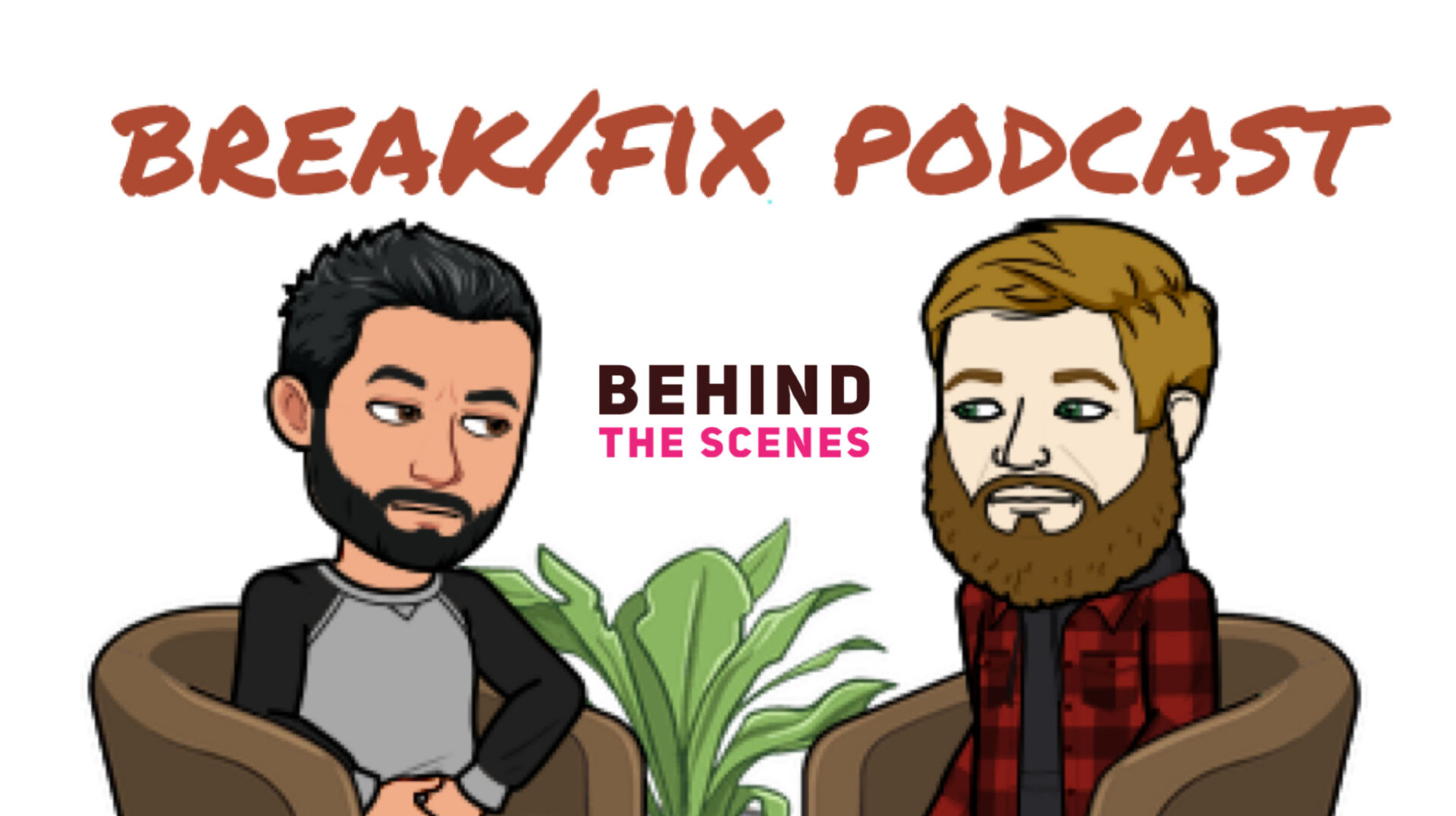
Consider becoming a GTM Patreon Supporter and get behind the scenes content and schwag!
Do you like what you've seen, heard and read? - Don't forget, GTM is fueled by volunteers and remains a no-annual-fee organization, but we still need help to pay to keep the lights on... For as little as $2.50/month you can help us keep the momentum going so we can continue to record, write, edit and broadcast your favorite content. Support GTM today! or make a One Time Donation.

If you enjoyed this episode, please go to Apple Podcasts and leave us a review. That would help us beat the algorithms and help spread the enthusiasm to others by way of Break/Fix and GTM. Subscribe to Break/Fix using your favorite Podcast App:
 |  |  |
Throughout his career, Malcolm Bricklin has been known for his unconventional ideas and his willingness to take risks. While his ventures have not always been successful, he has remained a respected figure in the automotive industry and a symbol of American entrepreneurship. He has also been the subject of numerous books, documentaries, and articles, chronicling his many successes and setbacks in the business world.
There's more to this story!
Be sure to check out the behind the scenes for this episode, filled with extras, bloopers, and other great moments not found in the final version. Become a Break/Fix VIP today by joining our Patreon.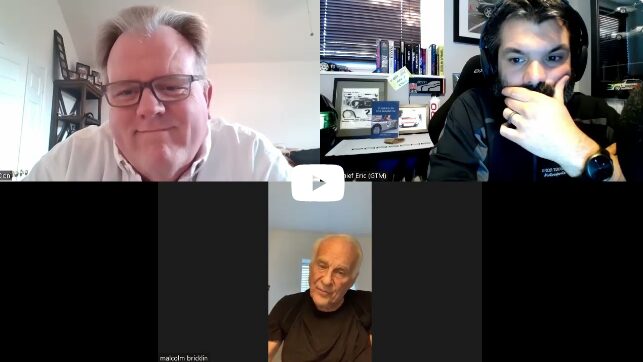
All of our BEHIND THE SCENES (BTS) Break/Fix episodes are raw and unedited, and expressly shared with the permission and consent of our guests.
If you’d like to learn more about Malcolm and keep up with all the progress over at Visionary Vehicles be sure to logon to www.vvcars.com or follow him on social via LinkedIn or Facebook.
The new Visionary Vehicles 3EV
Pure Electric. 100% Electrifying – with a 275+ Mile Range. The 3EV is the leading edge in three-wheel, fully-enclosed, two-passenger, zero-emissions, eco-mobility personal transportation.
Engineered for safety and stability, the 3EV has a full complement of electronics and comforts for both driver and passenger. With its 275+ mile range and superb performance, you’ll enjoy an exhilarating, luxurious driving experience at an affordable price. MSRP $28,980 and $36,980* – LEARN MORE
There’s more to this story…
Some stories are just too good for the main episode… Check out the Behind the Scenes. Available exclusively on our Patreon.
Guest Co-Host: Don Weberg
In case you missed it... be sure to check out the Break/Fix episode with our co-host. |  |  |


